The Naked Child Growing Up Without Shame
<< Chapter II >>
From naked children came these adults
The children of open families talk about their lives
Dennis Craig Smith, Paula Span, Jonas Hållén
They felt openness about the body was healthier for their children so they became nudists.
The entire family had spread themselves out around the Monopoly board that occupied its normal Sunday afternoon position in the middle of the living room rug. All members of this group — father, mother, a boy of eleven, and a girl of eight — took their turns, teased and laughed and played the game as they regularly did on the weekends. The father managed his own public accountant business and their mother taught school at the same junior high school both children attended. A typical family? Yes, except for one thing. Each member of this family was totally and shamelessly nude.

Theirs was one of those families that called themselves nudists. To their neighbors that identification might have set them apart, but they didn’t see it that way. There was little else about them that was different from the other families living in their neighborhood. The children have long since grown and left home, but their father still manages his own public accountant business and their mother remains a junior high school teacher in the same school both children attended. Still, they recognized that their nudism might offend others. Even though they’d been nudists all of their lives, the children never discussed their family’s ideas about nudism with any of their friends or classmates.
This family became nudists after both parents were invited to attend an open house at a nudist club by some friends who were curious and wanted someone they knew to go along with them on their first visit. Neither couple had children at that time, but they were impressed by what they saw and became members the following month. The two young couples decided, when they did become parents, that they wanted to raise their children as nudists. They reasoned that openness about the body was healthier for them and their children, both mentally and physically, than hiding and concealment. Also, they thought it would be a positive way for their children to become sexually aware within the more controllable influence of the family.
When these two young couples chose to raise their children this way, they did so completely on speculation. There were no proven empirical studies on which to base their feelings and decision. What’s more, they reached their conclusions against the advice of the legions of experts who warned of the dire results of such practices, especially during certain vulnerable years in a child’s pre-adolescent and adolescent development.
Now this boy and girl — and many other children like them — have grown up. Have they become the people their parents hoped for or the victims of a misguided openness that the experts warned about. What was their fate? Are they suffering from sexual envy? Do they spend inordinate amounts of time focused on sex? Do they hate their parents? Did the boy envy his father’s penis and desire his mother sexually? Did they struggle, as children, to resist the “seductiveness” of their parents?
The children have long since grown and left home. But they carry with them the attitudes and morality they acquired when they were young. We now have the opportunity to look at — and into — the lives of these and many other nudist-children-turned-adults. As we meet with many of them, we will try to determine what kinds of people they have become and, perhaps more importantly, what kinds of people they think they have become. What has happened in their lives may throw light on the true effect of family and social nudity on children’s emotional, sexual, and psychological development.
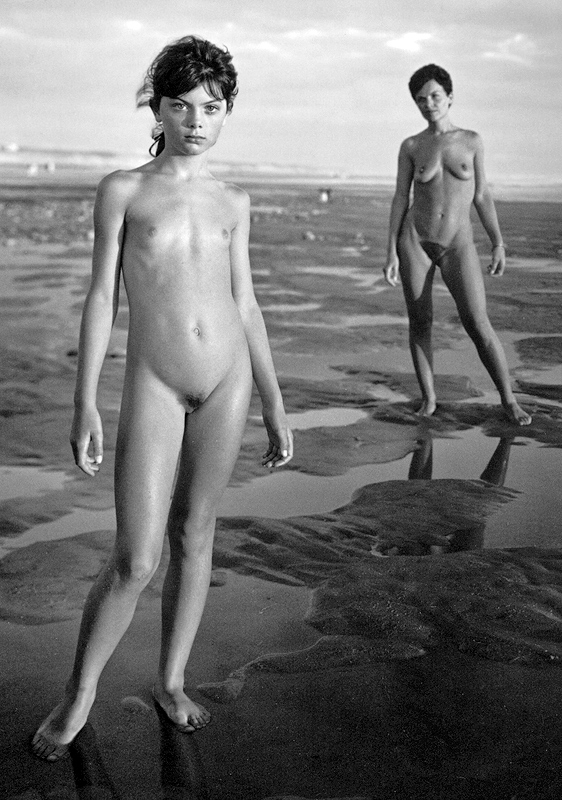
Grace (Denise)
The first of the adults we talked to was a single girl in her mid-twenties who is attending college in Southern California. We met her at a nudist camp near Los Angeles. She was quite willing to tell us about her life as the daughter of nudist parents. She also informed us that she intended to raise her children in the same nudist atmosphere that had been provided for her by her mother and father.
“I was born a nudist.”
This young woman is twenty-five. She is majoring in history and has always been an excellent student. She received a 3.8 grade-point average when she graduated from high school and is maintaining that same level of achievement in college. Her parents own and live on the premises of one of the largest nudist camps in the state. While in school, she stays with a relative in Los Angeles, but she visits with her parents whenever she can. Our conversation with her went like this:
Q: When did you first become a nudist?
A: I guess I became a nudist when I was born. My parents were both members of a travel club and I don’t ever remember not being around people who were nude — until I started school, that is. Then, of course, I got quite a shock. We had lived for a while at a nudist camp just before I started school, so I was amazed that other people wore clothes when they played or just relaxed in the sun. In fact, this was what caused my problems with nudity in years to come.
Q: What kind of problems did you have with nudity?
A: Well, my parents were very enthusiastic nudists — especially my father. My mother liked it and all, but my father was really a believer. He was like a missionary. He wanted everyone to see that nudism would lead to world peace, perfect health and life everlasting. (Laughs) I’m kidding. But he really did believe strongly in the benefits of nudism, and when I got into junior high and started to feel self-conscious about my changing body, he just couldn’t understand it. It didn’t seem to affect my girl friends from the camp the same way it did me — having budding breasts and pubic hair — but I found that I was reluctant to undress at the club. My father reacted as I was afraid he would. He made me undress and refused to let me keep my clothes on when we were there. I think this caused it to get worse. I just stayed in the camper the whole time and wouldn’t participate in any of the camp activities.
My relationship with my dad really suffered from this and for a while we barely spoke. I think he felt guilty — but he also felt that being free and open was the best thing and that I would see the light and love him for what he was doing. We weren’t close at all during this period, but my mother and I had a great relationship and I think all this brought us even closer. She understood me much better than my dad did and helped me get through a very difficult time in my life.

“By nature I’m somewhat of a loner.”
Q: Did you ever come to a time, while you were young, when being nude around others didn’t bother you?
A: Yes, although it took longer for my relationship with my father to get back to normal. Actually, it wasn’t all that long a period when I felt shy about being nude, but I think one thing that prolonged it was being told by my dad that I had to get over it.
I’m as stubborn as he is, so it was a standoff. The modesty itself didn’t stay around for a whole year, but I wasn’t about to give in to my dad. I think I extended it to about three years, particularly when my dad was around. What’s funny is that when he was gone I would take my clothes off and join my friends. But only to some extent, you know. By nature I’m somewhat of a loner. I often like to be by myself and just read or think — or simply enjoy the solitude. My family is very gregarious, and this made for some more Conflict and mi sunderstanding.
Q: How do you relate with your family now?
A: Well, my mother and I have always been very close, although she is more social than I am. My dad and I are slowly getting back together. Oh, we get along now. I think he’s coming to understand me much better as a person than he did before and so we are just now starting to get close. It really is a great feeling. I just wish we could have done it years ago.
“I don’t think you should make a child do something just because you believe in it.”
Q: You came back to the philosophy of nudism but you had a very difficult experience with it as a child. Do you see yourself leaving nudism when you have children of your own?
A: If I have children — not when. If I have children then I very definitely will want them to be exposed to it. There are some things about me that I also want them to have the opportunity to develop as they grow up with. I mean, like what I am and what I have become. I think nudism — openness — has had something to do with what I am today. The thing that I would change, avoid is the force. I don’t think you should ever make children do something just because you believe in it. Most kids will want to do what their parents do, anyway, but force them into it and there will be a problem. My friends who grew up as I did never had the same trouble. I’m not saying that there aren’t other kids who grew up nudists and had the problems I had, but I don’t know any that did. I didn’t know anyone like me. Still don’t. I’ve always been kind of odd. Well, different.
Q: Do you think your experience with your dad and that having your dad force you to be naked has hurt you as a person, as a complete adult?
A: No, not at all. In fact, I think it has helped me to understand myself and who I am. I know it has helped me understand others, especially people like my dad who believe so strongly in something.
Look, I don’t feel I have any sexual hang-ups. I don’t mean that I’ll do just anything, or even that I have already done it. I just mean that I’m not afraid of my body and my sexuality. I can enjoy both, I feel, to a more meaningful, intense, and satisfying dimension. I feel strongly about that, probably as strongly as my dad felt about our family being nudists.
I don’t think you have to be a nudist to reach what I feel I have, but the open and free feeling about one’s body, our bodies is essential. You can’t be afraid of the sight of genitals like mast of the people in our society are today.
Q: How do you feel about the statements by Dr. Joyce Brothers and Dr. Benjamin Spock about the possible effects of nudity on children?
A: Well, one problem arises when they use words like results. Does that mean what the children will turn into as adults? Or that in the next hour, day, week, or month they will feel a certain way?
I think Joyce Brothers just hasn’t experienced this and is speculating on possible outcomes. Of course it is possible that a person exposed to nudity as an adolescent will grow up with “terrible guilts and frustrations,” but not as probable as when a person grows up not seeing open and non-erotic nakedness. When I hear claims like that from people I think it says a lot, reflects more about their own problems with sex.
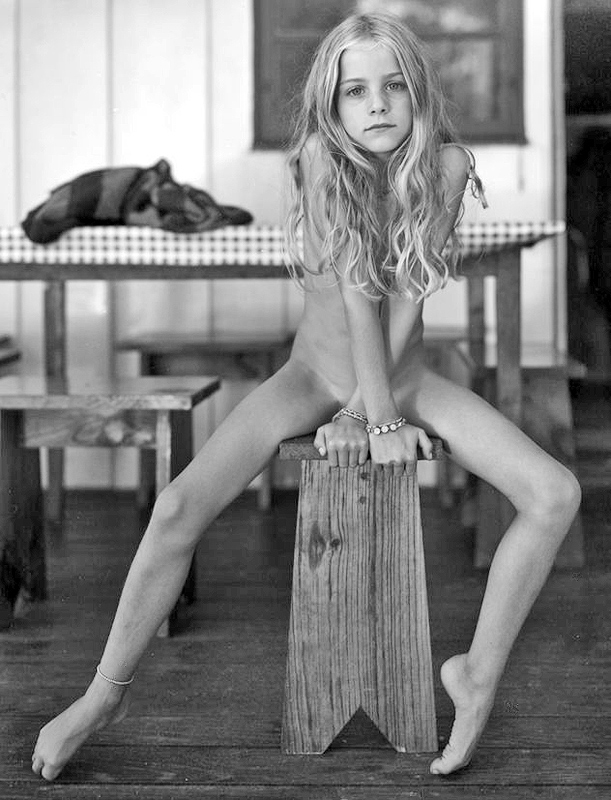
“I was a virgin until I was out of high school.”
Q: What about sex play among the children here at the nudist camp? What about your adolescent experiences with sex?
A: As I told you, I’m a bit of a loner. I was a virgin until I was out of high school. My closest girl friend from the camp when I was in high school was a virgin until she was sixteen, but at nineteen she married the boy she’d had sex with and they now have two kids and are members right here at this camp. There was sex play among the kids I grew up with, but what I’m saying is that I don’t feel they became involved in intimate sex any earlier than the kids I knew from the outside.
Q: Were you ever sexually attracted to either of your parents?
A: Me? You’ve got to be kidding. No, and I was never “overstimulated” by the sight of my father’s penis, either. It never stimulated me at all. I don’t feel aroused by the sight of penises now unless it is in the framework of a lovemaking situation.
You know, the problem with people making statements about being raised as we were is that they are making those statements with their own backgrounds as their moral frame of reference. If you don’t believe in premarital intercourse, and you think nudity means sex, then anyone who grew up in a nudist environment and enjoys sex outside of marriage will be seen as having been overstimulated as a child. For them any stimulation is too much outside of their moral code.

Richard (Dicky)
The next person we looked at and talked with did not grow up a nudist. His was a family that did not belong to a nudist club, nor did they socialize with other people who did. To put it simply, his family believed that openness and “physical immodesty” among family members was logical, and that nudity was, therefore, natural.
This subject is a forty-year-old commercial artist who lives with his second wife and their thirteen-year-old daughter in Los Angeles, California. He has two children from a former marriage, both of whom live with their mother in another state.
From an open family to the seminary and back
Dick was an honor student throughout high school and in the seminary where, at one time, he studied for the priesthood. But he left it just before completing his commitment. Later, he worked as an engineer for I.T.T. at an Air Force Base in California. He now works freelance out of his home and has more work than he can handle. His hobbies are horticulture, growing orchids, and learning as much as he can about the world around him, especially, he says, about animals and plants. (This interview is presented in its entirety as was the first. Most of the following persons we spoke to will be presented as case studies as opposed to direct interviews.)
Q: First of all, Dick, where were you born?
A: I was born in Bell, California, which is now down in the biggest industrial center of Los Angeles. It was farmland then.
Q: How old are you?
A: I’d rather not say. [He seemed to reconsider.] Forty. It’s a very discouraging age.
Q: How would you describe your family’s attitude about modesty — nudity?
A: They were very open about nudity. They were not true practicing nudists in the sense that they belonged to an organization or anything like that. No big thing was made of nudity, though. It was a natural thing. If it was hot weather and nobody felt like wearing clothes, nobody wore clothes. It was not flaunted, however, in anybody else’s face. If anyone showed up at the ranch, at least something was put on.
Q: Did you ever dine in the nude?
A: Not with my parents, no. Well, I take that back. In later years we’d be in swimming or something, and we’d maybe eat, too.
Q: It was just pretty casual?
A: Yeah, very casual. Extremely natural. Much the way my life is now.
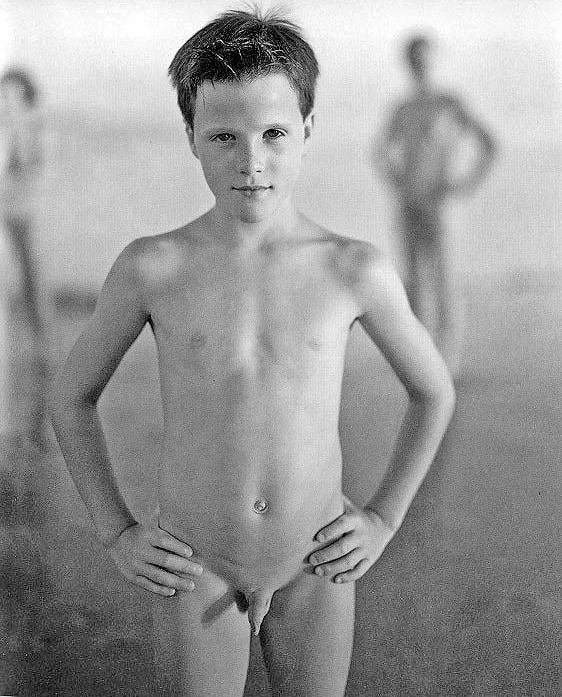
Q: Do you ever remember feeling ashamed of that?
A: At times, particularly as I approached puberty, which I think was a rub-off of peer groups. I went through quite a stage, which lasted up until my early twenties, I would say. There were occasions when I went nude, but there was an embarrassment involved, and I never really understood why. I went through a very conservative phase in many aspects of my life at that point.
Q: How religious was your family in terms of going to church regularly?
A: In that sense of the word, not at all, because they were basically Quakers and never participated because the nearest Quaker church was seventy miles away. In my sense of the word, particularly where I’m at today and have been for many years, they were quite religious in that they had an innate morality unto themselves, which they practiced as best they could. It was probably more of a moral code than most people who call themselves religious.
Q: Do you remember either one of your parents being more open or more understanding about sexual matters?
A: Not necessarily, no.
Q: What about typical leisure-time activities as you were growing up as a family?
A: We did things together, basically. Camping — that sort of thing. Our biggest entertainment was listening to the radio, and that was limited to only certain times of the day, because we didn’t have electricity. Only when the electric plant was running could we listen to radio. That was a primary occupation. “One Man’s Family” on Sunday nights was a big thing. The Philharmonic, also, which is probably where I got my base in classical music. I’m not a musician, but I appreciate it.
Q: Born in Bell, when did you move to Perris?
A: When I was about a year and a half old. There are some vague memories of Los Angeles, but very, very few.
Q: So a lot of the time was taken up by family things around the home and working on the ranch?
A: Oh, yes, taking care of the animals. Two hours of chores in the morning, two at night. Before and after school — birthdays included. Chores bothered me. I figured I should get my birthday off, but it never happened. We were isolated, which is probably another reason why the nudity was such a casual thing. Very, very seldom did we have unannounced visitors because we heard and saw them coming from two miles away. We lived up on a hill. People didn’t just accidentally drop in. So by the time someone would arrive, we’d be dressed.
“We felt there should he more religion in our home.”
Q: So you’d describe your family as pretty close family?
A: Yes, especially during the early years. During high school, some things happened due to religion which caused some great separations which continue to this day.
Q: What things?
A: Both my brother and I almost simultaneously became unhappy with the religiousness of our home. We felt there should be more. And, again, fostered by peer group relationships, my brother, due to his girlfriend, became a conservative Southern Baptist. He’s one to this day. He married that girl. He really never had any other girl friend. One for a year in the eighth grade, which I don’t count as a girlfriend.
I was more logical about it in that I felt a need for something and took almost two years to decide what I wanted to be. I wanted to be something, but wasn’t sure what. I ended up as a Catholic, by my own choice, after having exposed myself to all others that I was able to expose myself to, including my brother’s church which I seriously disagreed with. Because I became a Catholic, and because of his pastor, my brother then began to hate me, and was trying to save my soul for me, which I didn’t appreciate. I can save my own soul. As a result, a great rift has occurred between us. It’s there to this day. We’re on speaking terms, but we seldom see each other.
Q: How about you and your mother?
A: No problems. My folks were just tom apart because of the rift between my brother and me. Later on, my parents became Catholics, which was a great surprise to me. I never anticipated it. They were Catholics up until shortly before my father died, I would say. My mother still claims to be, but by church rules she isn’t. She doesn’t go to church.
Q: Did your going to the seminary have anything to do with their changing, do you think?
A: Possibly, although I wasn’t there to tell what was going on. I came home summers and vacations, and was quite occupied with my own self in life at that time. I wasn’t paying that much attention. Suddenly, they surprised me by saying, “We’re becoming Catholic.” They were taking instruction. I couldn’t believe it.
Q: When they became Catholics, did you notice any difference in their attitudes or morality?
A: I think there was a change. There was a greater degree of conservatism, although not nearly as much as I was professing at the time. Almost always, I was super conservative — politically, religiously, morally — every way. It was just part of what I had chosen as my way of life. Not that I disagreed totally with the other way that I had been raised. And it was not until many, many years later that I reaffirmed, or rejoined, what I grew up as. Then I really began to appreciate it for what it was.

“Why should I start wearing pajamas just because we now have a baby girl in the house?”
Q: So in that period of your life you didn’t take part in social nudity?
A: No. My first child was a boy. (I had been raised in a family of two boys; therefore I felt nudity was no problem.) Although I did resolve in my first marriage, for some strange quirk in my mind, that if I had a daughter, for some reason, this should be a problem.
Our second child was a girl. And I suddenly realized that if I was going to continue to go to the bedroom from the bathroom with nothing on, she’d see me (this was, even during my conservative period, a very, very casual thing). Suddenly, I’m supposed to start wearing pajamas and all this.
My wife even asked me about it. And at that point I made a decision: No! Why should I start wearing pajamas just because we now have a baby girl in the house? This is ridiculous! I personally dislike pajamas. My wife didn’t like that, but she consented to it.
Again, in my second marriage, I ran up against this, too, to an extent — in the beginning. But, by this time I was no longer a Catholic anyway, and I firmly resolved that it was not going to become a rule in the house that everybody was dressed up all the time.
Q: Can you think back to any particularly traumatic times in your adolescence?
A: No one in particular, other than the normal traumatic experiences one goes through at that point in time.
Q: Like what?
A: Like being afraid that your peers don’t think you’re male enough. Like being afraid because you’ve discovered you are male and the external signs this creates in your being. And just all of the uneasiness that goes with living through that period. Suddenly, you’re becoming a different person, having different reactions. They’re pleasurable, but you’re being told that it shouldn’t be pleasant, you shouldn’t be experiencing them, you know. It’s total, general confusion.
My father bent over backwards to explain things to the point of embarrassment at times. That bothered me, because half of the time I already knew what he was trying to tell me, anyway. Here, again, I think everybody goes through a phase like that.
Q: How would you describe your sexual experiences? What kind of sex experiences did you have as a child?
A: As a child, nothing other than the usual experimentation one goes through, preliminary to post-pubescent masturbation. Of course, masturbation as an adolescent. Some guilt connected with this though, which is possibly what drove me toward religion. In fact, in looking back, I’m sure this was the case.
And then, once I became quite religious, it
became an extreme problem within myself, especially after becoming a monk and expected to take a vow of chastity. There’s no such things — period. And, of course, I’m a human being. That was one of the reasons I left the monastery. I didn’t feel that I could, for the rest of my life, live up to something of that nature. Along with other facets.
“My first wife was the first woman I actually went to bed with.”
Q: What about your first sexual experience?
A: Individually, or with someone else?
Q: With someone else.
A: Quite late in life, believe it or not. At least, to the point of culmination. There was heavy petting through high school with various girls. My first wife was the first one I actually went to bed with — shortly before we were married.
Q: Twenties?
A: Yeah, because I was over twenty-one before we met. I was about twenty-two, probably. First person I’ve ever told that to!
Q: You just told it to the world! Along with your non-involvement — sexual involvement — through to your becoming religious.
A: I hate to jump in here, but becoming religious was a way of sublimating my sexual life. As I hinted before, it was part of the reason — it was bothering me that sex was so predominant in my life. Because, to put it bluntly, to this day I’m a horny person. And because of what society was telling me — all the way from the Boy Scout manual, which says, “Thou shalt not” — do anything, you know, until you are married, on through the subtleties of peer groups and everything else — I was confused. It’s constantly being drummed into you, “You shan’t, you shan’t, you shan’t.”
But you shall! There’s a double standard involved. It’s very hard to cope with. And I’m the kind of person who can’t ride a fence. I can’t in one breath say “yes” and in another say “no.”
I can go one way or the other, except being a conservative seemed to be the easiest. Trouble is, it didn’t work.
Q: Tell me about elementary school. What kind of experience do you remember about elementary school?
A: Sexually?
Q: No. Just how did you feel about school? How were your grades?
A: Relatively good. My grades were excellent. The biggest problem I had was when I entered school. It was the first year there was kindergarten. I did not go to kindergarten. There was no way of getting me back and forth. Too far away. The people who did enter kindergarten that year knew, the year before, that there was going to be a kindergarten, and the parents had held them all back.
My birthday occurs in November. I shouldn’t have really started first grade the year I started. I should have been held back until the following year. They do that now. So, as a result, when I entered school, the majority of my classmates were physically and mentally and chronologically two years older than I was.
We got along fine, except I was also small. I’m not still a small person. But I didn’t develop until long after I got out of high school. I was a very small person, and the other kids were two years older than me. This gave me a severe inferiority complex, which, somehow, I’ve overcome.
Even then, I was able to be
successful. I made friends and everything, but deep down inside I was one scared-to-death kid all the time. Because I had to use my wits constantly in order to survive. There was no way I could stand up to somebody in a squabble, you know. Physically, it was impossible.
I really never in my life have been in a fight, because I learned very early in life how to stay out of fights, without losing face, as much as possible. This is probably something that has paid off in me to this day. I never succeeded by force. I succeeded by my wits, and that’s how you really succeed in the world, by your wits, not by force.
Q: How about high school?
A: I had a problem with appearance because I had a strange conglomeration of teeth in my mouth. By the time I got to high school, this had been rectified. I finally was able to really come out of my shell. I was beginning to mature — I was popular, quite popular, in a lot of activities. I got very good grades, except in mathematics. I ended up graduating in the Scholastic Society. I was on the staff of the school paper, in the student council, you know.
Q: Were you a B or A-minus student?
A: Oh, no, it was an A. I only had two D’s in high school, and a couple of B’s, and that was it. It was a 3-point-something.
Q: What about college?
A: That was in the seminary, which was totally different from what I had ever experienced. Interesting. Highly controlled in discipline, exteriorly and interiorly. Very small classes — which meant you either knew your subjects when you went in or you didn’t. In other words, no faking anything. I did discover one thing when I went to college: I’d never learned to study. School had been easy for me. For instance, history. In high school I would read the chapter assigned for the next class and sit through class without even taking notes. I got straight A’s.
Q: Did you go directly from high school to the seminary?
A: Yes. When I got there I found out that, at that point, you’re really expected to learn something. You can’t just read back what the teacher wants to know, which is what I had done. Especially in a small class of five students, in a history class, or a language class. And the professor can very rapidly determine if you know what you’re supposed to know today, or not. He has the time to do it, whereas in a large class you don’t have the time. You sort of skate by.
Q: How would you describe yourself sexually now?
A: Open. More open than my wife, that I know. Willing to experiment. Very few hang-ups involved, at this point in my life. I’m sure there are some; I think anybody, if you dig down deep enough, would have some. I know there are some things I wouldn’t do, sexually, which probably have to do with my own religious attitudes about giving pleasure, not pain, to others.
Q: What percentage of your time would you say you spend thinking in a sexual way?
A: Frequently is the term I want to use, but that’s a meaningless term. You have to almost get it down to a thing of statistics. Out of a five-minute period, probably a minute of it, sexually involved in one way or another. Now there are certain periods when I get super-involved in my work, where I have so many things going on I don’t even have time to think about eating. But in a normal situation, it’s frequent.
Q: Twenty to twenty-five percent of your time?
A: Yeah!

“Thing is, I had seen other women nude, also.”
Q: This may sound silly, but do you ever remember having sexual desires for your mother?
A: No. I remember she wasn’t a beautiful woman to start with.
Q: Even though you saw her nude on occasion?
A: Thing is, I had seen other women nude, also. For instance, when we were little kids growing up, there were neighbors who had a reservoir where we went swimming and they went swimming. And occasionally everybody would be nude.
At my grandparents’ reservoir, the same thing. It was a very sparsely populated area, and periodically people would get together and sometimes nudity would occur in swimming and sometimes it wouldn’t. It only occurred with other people when swimming. Not an around-the-house type. So, therefore, the sight of a nude female body was not unusual. It was not something I had never seen. Of course, my mother was very interested in art and had art books all over the house. I knew who Michelangelo was and what his work looked like very early in my life.

“They exposed us to the best...”
Q: What was the intellectual climate at your house?
A: I would say at a very high level. Higher than average. Both of my parents were college educated. They felt very strongly because of where we lived — it was very isolated — that it was important for my brother and me to be exposed to everything possible. They probably went overboard, but I don’t regret it. For instance, botanically, I knew things then that I don’t know now.
I could go on a hike across the ranch and give you the Latin classification name for almost every plant on the ranch. I can’t do that today. I could partially do it on some plants, but not like I did then.
They exposed us to the best in music, the best in literature. Everything, on down the line. As best they could, because until I was in my middle twenties, I had never seen a live symphony concert, except I had heard symphony music all my life.
Q: Did you study art in college?
A: No, not in college; there were no art courses at all. I used my art talents. In high school, I took every course which was available, which was not much. There were two art courses offered, and two mechanical drawing courses — that was it.
Q: At that time, were you thinking you would be an artist?
A: In high school, my intent was to be an architect, right up through to almost the end of my senior year. Even to the point of applying to several universities and schools of architecture. I was accepted at USC and the University of Utah. And then at the last minute I decided to go to seminary, and totally changed my life. Which has had a great influence on my whole life.
Q: Looking back on the whole of your family life, adolescence, pre-adolescence, and your high school, what do you think of your parents’ way of raising you?
A: I think it was very good. There are certain facets, some of the really drastic things, that I, now being a parent, try very hard not to do (though I find myself doing the veiy things I hated in my parents on occasion).
As I mentioned about my father, I felt he was too strongly attempting to show me the way, sexually. I think he was trying to live in me things he hadn’t done himself. I suspect this to this day. Or that he had done and thought his son should do, too. He was almost too open at times. This bothered me. I think it needs to be a more subtle thing. Answer a question when it’s asked rather than providing the answer with no question. That, I think, is important.
Then there are, of course, the normal things between parents that have nothing to do with sexuality, nudity, or anything else, which I try to overcome. Just the way they treated each other was probably the biggest one. They loved each other dearly, but they fought like cats and dogs. Not with blows; they fought with words. Subtle, cutting words, up to the day my father died. It used to drive me up a wall.
Q: Do you plan to raise your children in the same kind of nudist — or immodest — environment?
A: Definitely. I disagree with the word immodest. I would say open environment. Modesty is a cultural thing. It’s a false statement in most cases. People can be super-sexual behind their modesty. And I think they are, frequently. I don’t feel immodesty is the right word to use in describing the kind of family nudity I experienced. Immodesty I don’t feel is a sexual cover.
I do plan to raise my children that way, but I find it very difficult in today’s society. The isolation that I had as a child is not there. My parents were, like, working in a laboratory; they had very few outside influences to deal with. And it was really kind of neat for them, and easy.
I’m in a situation of being against my brother and raising my daughter in a large metropolitan area. Luckily, we’re able to live in an area where the schools are pretty good, this year. With what’s happening, who knows, next year, she could be anywhere, and see the worst of what occurs in the city.
By this point in her life, entering junior high school, if I haven’t instilled it in her now it’s too late anyway. Which is really a frustrating point in life as a parent, because either you’ve succeeded or not, and you keep pointing down the same road. By this time, the die is cast. At this point, all you do is pick up pieces. It’s scary — very scary.
Mandy
Born in Worcester, Massachusetts thirty years ago, Mandy comes from one of the more active families in the social nudist movement during the fifties and sixties. Her mother was a member of the Western Sunbathing Association Board of Directors and published a number of nudist newsletters along with being an officer in many clubs. Her family first became nudists after they moved to California and joined a club in San Bernardino when Mandy was eight. She recalls they joined for health reasons although they had no medical problems at the time. It was her father’s way of avoiding any, and it also allowed him to relax and forget his work while they were at camp. Because of his work, he did not become as active as his wife in organized nudism. He was in the computer field, and until Mandy was in junior high her mother worked as a secretary. Mandy characterizes her family as very, very close and open with each other — even when they lived in the East. “I think we were pushed even closer as a result of our camp activities. Nudism, especially at that time, was totally a family oriented experience.”
“To this day I idolize my father — he can do no wrong — and my mother is my best friend.”
Mandy lives by herself just blocks away from her parents and explains she feels as close to them now as she did when she was growing up, an only child in a nudist family. She is divorced, with no children. She currently attends UCLA, where she studies public relations, the field she hopes to enter upon receiving her degree.
Her parents do not participate in nudism today — they do not attend camps or hold active memberships in any clubs — and Mandy remembers they dropped out in the middle sixties because of the permissiveness of that era. Nudist clubs began to allow beer and alcohol on the grounds, and although they were not against drinking in itself, Mandy’s parents felt it did not belong in nudism. The sexual revolution of the sixties found its way into the movement, too, and consequently her mother and father felt further and further away from what they had enjoyed so deeply before. They are still casual and relaxed about nudity in their own home but feel certain that the camp involvement is gone for them for good. Still, they do have an abundance of friends they met during their active years in nudism.
“My parents were very strict, even old-fashioned, but then so am I. They exposed me to what they wanted me to see and protected me from what they didn’t, and I never had trouble with that. I respected them because they were always fair; at least it seemed they were at the time, and, looking back, I’m sure they were.
“I wasn’t allowed to date until I was sixteen, but it was consistent with most of the other nudist families we knew. That’s why they were our friends, I suppose, and I never questioned it. That was the way things were. To this day I idolize my father — he can do no wrong — and my mother is my best, closest friend. I dread the day when something happens to either one of them because I can’t conceive of one without the other. I’ve never heard them argue or fight. Things were always discussed privately and calmly. I love my parents more than anything.”

Bonnie Johnston’s parents are not alone in facing the dilemma of whether nudity in front of children is harmful or helpful.
“I don’t seek out nudism as a social affair.”
Mandy said she is not currently a social nudist, though mentally she still is and always will be. She remarked, “I don’t seek out nudism as a social affair.” But she recommends it to her friends and does on occasion visit a camp. Once, she told us, a friend was visiting when we called regarding the study. After she hung up, her friend asked what it was all about and Mandy explained she had been raised a nudist and asked the friend if she’d care to come with her to a camp. Her friend had an eight-month-old daughter and Mandy was so enthusiastic about the benefits of a nudist camp for a child that the friend accepted her invitation and seemed to really enjoy the experience.
Mandy explains that other things take up most of her time presently, not that she doesn’t enjoy going to camp but, what between Sierra Club, an interest in photography, her studies at UCLA, skiing — which she loves — and work, there is not much time left.
“My ski club has skinny dipping parties, but I don’t participate.”
“It’s funny,” she told us, “I’m considered a prude in my circle of straight non-nudist friends. My ski club has skinny dipping parties, but I don’t participate. It’s the sexual overtones in that atmosphere that I don’t feel comfortable with. Too much peek-a-boo: guys and gals getting together to see what develops. I don’t like the ’ho, ho, ho, let’s see yours’ attitude and that’s why I’ve always liked the camp. Even after the permissiveness that caused my folks to leave, sex was never as blatant and adolescent as at my straight friends’ parties these days.”
At thirteen, Mandy dropped out of the nudist movement — more out of interest in school and neighborhood activities than because of a disinterest in nudism. She simply chose to spend her time with friends from school and became very active in Jobs Daughters. It wasn’t until she was nearly seventeen that she again began going to nudist camps and involving herself in organized nudism. In 1966 she was elected National Teen President of the Junior American Sunbathing Association. That involved traveling throughout the country to speak on behalf of nudism and its junior members.
When she was eighteen, she appeared on the Michael Jackson radio show in Los Angeles and was interviewed nationwide by countless newspapers, and by radio and television personalities. For “a shy, quiet, pretty ordinary-looking kid, who wasn’t much of an extrovert,” the honor was one that did a lot to bring Mandy out of herself and help her to gain confidence among people.
“I really feel fortunate to have had the experiences I did both in my family and in organized nudism. In the year I spent as president of JASA [Junior American Sunbathing Association], I gained so much. I am so thankful for that part of my life.”

“I was becoming a woman, and we celebrated it together.”
Sexually, Mandy still thinks of herself as a conservative, preferring the fundamental attitudes of her parents to the “liberated,” more progressive ideas of her peers. She was twenty-four before she experienced sexual intercourse and said she thought the only effect nudism had on her late sexual development was that she had little or no curiosity about the human body.
“Of course,” she explains, “my parents gave me the basis for that. I never felt guilty or embarrassed about my sexual self. Even when I was going through puberty my parents handled it perfectly. We counted my pubic hairs as they first began and they made a pride thing out of it. I was becoming a woman and we celebrated it together. They really made me feel my body was something to respect. I think probably that had a lot to do with my not needing sex, and not falling into a sexual situation until I thought I was ready at twenty-four.”
She didn’t begin to masturbate until after reading The Sensuous Woman when she was twenty. “I figured I’d been missing something and thought I might as well try it.” Today, she says she probably masturbates two to three times a month — whenever she feels the need. Her urges, she feels, are pretty much under her control and not the other way around.
When she was a small child, curiosity about sex and sexual exploration was nearly non-existent, although she did remember one episode when she was in the third grade with a little boy from the neighborhood. It was a typical “let’s see yours” game, complete with looking and touching, and it took place before the family moved to California and joined the nudist club.
She was so upset by the occurrence that she went to her mother in tears and confessed the whole thing. Her mother was understanding and supportive and gave out no punishment. But the experience was enough for Mandy. She never played doctor again.
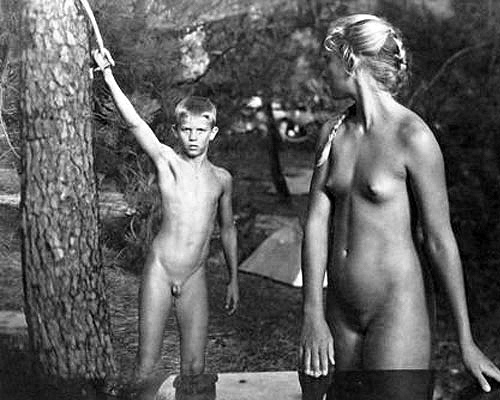
“Sex games in camp? It just wasn’t done.”
“I don’t believe anything like that went on in the camps we belonged to. I did not involve myself in that, so I don’t really know for sure. I just know that my parents taught me my body was just not to be abused. Sex games in camp? It just wasn’t done.
“The kids in our camps were not as active as the Sorensen study indicated as the average. I really don’t think any of the girls I knew as nudists in my pre- and early teens were non-virgins at fifteen. Of course, you do gravitate toward people like yourself, but I think they were a representative group from that time. You have to realize,” she told us emphatically, “this was pre-1965 and there are a lot of differences between then and now.”
“I am a sexual conservative, but tolerant.”
Mandy’s attitudes about sexual matters seem to reflect the kind of strict, conservative upbringing she describes.
We gave Mandy a series of topics on sexual attitudes and had her respond regarding such things as: Bisexuality, homosexuality, incest, adolescent sexual intercourse, oral sex, swinging (mate-swapping), and pornography.
She conceded that she had a great deal of difficulty understanding homosexuality. But, nonetheless, she felt no hostility or intolerance toward those with that sexual preference. “I just don’t see how we could be so self-righteous and judgmental as to make a sexual act between two consenting adults illegal or immoral. Bisexuality is simply another sexual preference, and although I have no inclinations in that regard, I know friends who consider themselves ’bi’ and I don’t avoid them. I’m just hopelessly heterosexual. Oral sex is not for me. I’m just not interested. I am a sexual conservative, but tolerant.
“Incest I’m really against — especially involving parents and their children. As for adolescent sexual intercourse, I don’t think they have the intensity to handle sexual intimacy. I, of course, don’t think they should be doing it. I wish it was that simple. However, I don’t think you can just tell them not to do it and expect them not to. We’d better recognize adolescent sexual activity as a reality and do an awful lot of educating, and hoping.
“Swinging, I think, is dynamite — and stupid as well. You just bring too many things into a relationship for most people to handle. If they can, well, fine but it’s not for me. Pornography I never got a kick out of so I really don’t know much about it.”
Do you think it’s reasonable to equate sex and nudity?
Mandy asserted that intimacy, whether people are dressed or undressed, cues sexual arousal. “I certainly don’t think that being nude watching TV or playing shuffleboard is sexually stimulating. The situation has far more to do with sexual arousal than the outfit.” She also compared being with a large group of nude people to a table with five hundred hot fudge sundaes. “After one or two I don’t think you’d be interested in any more hot fudge.”
At home Mandy said she didn’t spend time around the house in the nude because she usually keeps the windows open, but she maintained it would not be a sexual situation if she did. When asked whether seeing nudes all day dampens sexual drive she answered that since it is not a sexual situation it does not hamper excitation in a sexual context, “obviously.”
Does the nudist home environment place too much emphasis on sex?
“I think that’s ridiculous. A nudist home does not place any emphasis on sex unless there is some sort of aberration of the parental makeup, and then it wouldn’t matter whether there were nudists in the home or not. I did not see aberrations as I was growing up a nudist.”
Mandy said she had read the article in Redbook magazine by Benjamin Spock and was particularly amused at his contention that a girl seeing her father nude would tend to not get along with her mother because she blamed her for somehow depriving her of a penis. Penis envy, she thought, was created by men to keep women feeling inadequate. “The only thing I ever envy,” she added, “is that they can stand up to urinate.”
“I feel I’ve become a new person: I’ve shed an old skin.”
“I really do feel good about myself. Especially now that I’ve turned thirty,” she said convincingly. “I’m not sure why, but I feel like a new person. Like I’ve shed an old skin and I am suddenly more independent. Now I’m me!”
Mandy seemed to reflect the confidence she expounded. She’s bright, aware, and enthusiastic. Her feelings of independence were framed by her new attempts at college, a career, and a willingness to try whatever comes.
“How do I feel about being raised a nudist? I wouldn’t have it any other way. If I have children, they will be brought up as nudists.”
At the end of the interview, Mandy gave an example of a pleasant memory that may say best what she wanted to tell to the experts who warned against naked families and the consequences. “I did a lot of hiking,” she began. “It gave me an opportunity to go from the city out into the country and back. In the hills behind Olive Dell, in the chaparral, I got an exposure to mother nature, you might say. I think the most pleasant memory is a sensual one of standing at the top of the hill totally nude and feeling the breezes all over my body. It was such a feeling of oneness with God, the world, or whatever you want to call it. It was so right. I was alone. I was in a meditative frame of mind.
“Whenever I hear someone putting down growing up as I did, I can’t help but think of that time. If they could experience as I did that moment, then they’d never question nudism again. It’s just that simple.”
Deborah
Deborah is a young, high school educated nudist who feels strongly about the benefits of being raised as she was. She sees no negative consequences linked to her being brought up in an environment where children and adults spent most of their leisure time without clothing.
Physical beauty and nudity have always been a part — an important part of Deborah’s life. Married at eighteen, she traveled from Las Vegas to be a participant in the Miss Nude Galaxy Beauty Pageant at Samagatuma Nudist Resort in Ramona, California, just a few months after her marriage. Deborah’s husband, a non-nudist until they married, works as a truck driver in Nevada where they live and plan for a family some time in the future. We spoke to Deborah on the grounds of the nudist camp during the contest.
Deborah seemed relaxed and talked very willingly about her experiences. She told us that for as long as she could remember she had been a nudist. For most of her young life she and her mother had lived at nudist parks in Southern California. For her, being without clothes in front of others was a part of nearly every day of her eighteen years. Her mother, she explained, was very open and taught her about sex quite early. She seemed relaxed and talked very willingly about her life.
Deborah’s marriage is less than two years old and her husband, a non-nudist until they married, works as a truck driver in Nevada where they live and plan for a family some time in the future.
She doesn’t remember her natural father at all, but did have a stepfather for about one year, when she was eight. Her mother’s second marriage was a rocky one and ended quite abruptly. Most of the time after that, it was just the two of them — Deborah and her mother.
A Young Nudist Growing Up (Growing Up For A Young Nudist)
Deborah maintained that her high school social life was not hampered by her living at a nudist camp. In fact, she explained, they were pretty open about where they lived and most kids in school knew and accepted where she was from. “If they objected, they didn’t tell me,” she said, laughing at the question as if it was unthinkable for anyone to object to her living at a nudist camp. “I was fairly active in high school and pretty popular, I guess. That helps. My grades were pretty average. I suppose I worked mostly at enjoying myself and I really did that.
“I got into the normal kinds of trouble kids get into when they’re young, but nothing really tense. One thing, though. Adults always treated me like I was a lot older. I was one of the only kids who lived at the camp, so I got to do things that other kids didn’t. I worked in the camp restaurant at nine, and was babysitting before that.
“Working was something I always had to do because I had to share the load with my mother, and I liked the idea of being a big shot around camp. The other kids had to stay out in the eating area, but I got to work inside the kitchen. I was a big wheel with the other kids. I think it taught me a lot, though, and I really am glad I had the experience. I learned to prepare meals when I was ten, and right now I work as a fry cook for a restaurant in Las Vegas.
“I think growing up at the camp like I did really helped me, overall. It made me a fuller person.”
First Sexual Experience
Deborah says she first experienced intercourse at fifteen, and she began petting at about the same time. She “made out” [petted] with a boy from the camp, but her first intercourse was with a young man from her high school — a non-nudist.
“I’d been dating for a year or two when I went out with this guy. I really liked him. We were at the drive-in, and he got overly aggressive. I fought him off for a while, but I was curious and excited, and scared, and I gave in. It wasn’t very much fun, and it was a long time before I did it again. I think about a year and a half.
“Actually, I never had sex with a nudist kid. We were too much like family. I had sex with my husband before we were married, but he wasn’t a nudist either — not until we were married later, that is.
“Camp just wasn’t a very sexy place. There was always so much else to do. You never got bored at a nudist camp. I played volleyball, basketball, swam, worked in the restaurant, played pool, tennis, ping-pong, shuffleboard. I really think kids get into trouble when they have nothing to do. At camp we were always either busy with our jobs or having fun.”
When asked about sex in the nudist camp, she laughed. “Kids talked about it, but they never did anything. Just like other kids, we were more talk than action. I do remember some kids in my high school talking about a non-virgin club on campus, and I was shocked. One girl I knew from town bragged about how many boys she took during a party. She ended up selling herself down in San Diego, to the sailors.”
Masturbating at Six
Deborah began masturbating early. She remembers that at the age of about five or six years she began to masturbate with apparently no shame or guilt feelings connected to it at all. Most of her sex play, however, was simply genital fondling and exploring. Her orgasmic experience was much later developing.
She doesn’t recall anything regarding mutual masturbation among her nudist peers during the time she lived at the camps. “I never talked about doing it, and nobody else did, either. It was just a private thing that you did to yourself, and it felt good.” When asked if she masturbated as an adult, she smiled and answered: “No, of course not, I have a husband.”
“We go around the house nude all the time.”
Deborah said that being nude is not a once-in-a-while, momentary thing that she does in between dress changes and at bathing time. It’s a condition she enjoys as much as she enjoys anything she does. “Well, almost anything,” she added playfully. “My husband and I come home from work and we want to relax, so we take off our clothes and unwind. Understand, we live in a warm climate, and it’s the most comfortable way to be. But I can’t imagine anyone preferring to have any clothes on when it’s hot. When it’s cold, you wear clothes.”
When asked whether she ever dropped out of nudism or went through a period of time when she was shy or modest about being seen nude by others, she answered an emphatic, “Never. We go around the house nude all the time.” She said that it was totally inconceivable for her to think of being embarrassed about being nude in front of others, and then followed up with a question of her own. “Do you ever feel embarrassed about being seen with clothes on? I am a nudist. I grew up that way. Being nude is the most natural thing in the world for me.”
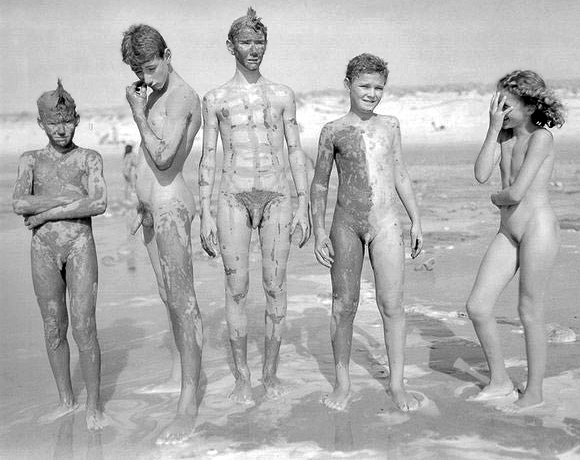
Penis Envy?
“Actually, I’ve always thought I was just a little better designed than those people who had that dangling thing hanging down between their legs. The only time I ever remember being jealous was once on a camping trip, when all my husband had to do was stand and point it. I had to practically undress to go to the bathroom. I never felt inadequate because I didn’t have a penis. Except for that once, I felt lucky I didn’t have one.”
Unconsciously seducing their children?
We told Deborah that some experts claim that parents who “paraded around nude” in front of their children were unconsciously seducing them. We asked her how she felt about the statement, and when she stopped laughing she said: “That’s my answer.”
She continued quickly. “Wait a minute. You know what’s wrong with that, really? First of all, anybody who parades around in front of anybody else is doing more than just being natural. That’s a loaded word, parades. If you were to say that if people were nude around their children they were unconsciously seducing them, and then compare that to the parading statement, you would begin to see the difference. In a beauty pageant, we parade. That’s the idea behind it. I think the word parade says more about the people making the statement and their attitude about their bodies than it does about the whole sexual seduction thing. I think it’s stupid,” she said, summing up her feelings in two words, “really stupid.”
Does nudity lead to sex?
When asked if nudity led to sex, Deborah’s response was laughter — again. “Does clothing lead to sex? Does going to the movies lead to sex? Having dinner, washing your car, or shopping — do they lead to sex? Sure,” she answered, “sometimes, for some people, in some situations.”
It angered Deborah that non-nudists seemed to always equate being without clothes to becoming aroused. “I wish the experts who wrote about all this would come to a camp, take off their clothes, and learn, once and for all, the facts of life. Being totally naked is not any more sexually arousing to a nudist than being without shoes is sexually arousing to Joyce Brothers. Unless she has a thing for feet.”
It is what a person is doing, Deborah contended, and with whom he or she is doing it, that brings about sexual arousal. “You can be totally dressed and be in a very sexual situation, just as you can be nude and be totally without sexual feelings. It’s silly to forget all the other aspects of sexual emotions,” she reasoned. “It’s hard for me to believe that intelligent people are making these statements.”
Deborah says she definitely plans to raise her children as nudists and feels that to raise them openly, without “shame,” will help them to respect their bodies and, therefore, to have respect for other people.
David
A twenty-year-old artist who currently lives in San Diego with his mother, David speaks adamantly about the benefits of growing up in an open physical environment. Although his life was filled with turmoil in his early years, he sees his experience with family and social nudity as one of the more positive aspects of his childhood.
Father won custody on the grounds mother was a nudist
When David was five, his father sued the boy’s German-born mother for divorce and won custody of their child on the grounds that the woman’s nudist practices were an immoral influence on her son, and that, in the interest of the child’s welfare, he be removed from her control and permitted to have full custody. At that time, David and his mother were living at the Swallows nudist camp in San Diego, and with the court ruling, he was awarded to the father, who was at the time a doctor in the Navy.
David’s father had been a nudist prior to the divorce, but “renounced” the practice before the case went to court. The judge was impressed with the father’s “enlightenment” and ruled in his favor. After that time, David lived most of his life with his father and stepmother, with whom he didn’t get along well at all.
David admits to being quite resentful towards this new family, because after the divorce was final the father resumed his nudist behavior and activities. He did not attend nudist camps, but he took the boy to free beaches, where they could be without clothes and not have the involvement of club membership and participation. David recalls that the nudist community was not happy with his father, who was not welcome in any of the ASA clubs where it was known what he had done to the boy’s mother.
Because of his father’s career, David moved around a lot. He has lived in Japan, Florida, Washington, and many places throughout California. During the time he lived in San Francisco — prior to the divorce — his parents took him to Lupin Lodge, a Northern California nudist resort. When he’d stay with his mother during the summers, she would take him with her to Lupin Lodge or to Oakdale, near Los Angeles. David, until he was fourteen, spent much of his time during the summer in nudist camps. For him, nudist camps were a summertime activity.
His mother says David became a nudist when he was just a gleam in his father’s eye. She was raised in Germany and came to the U.S. when she was a young woman. She met and married David’s father shortly after arriving here. Her German family background was very open. Physical modesty within the family was unheard of. American nudism was the natural extension of her German upbringing, and she became a strong proponent of the social nudist movement of the time.
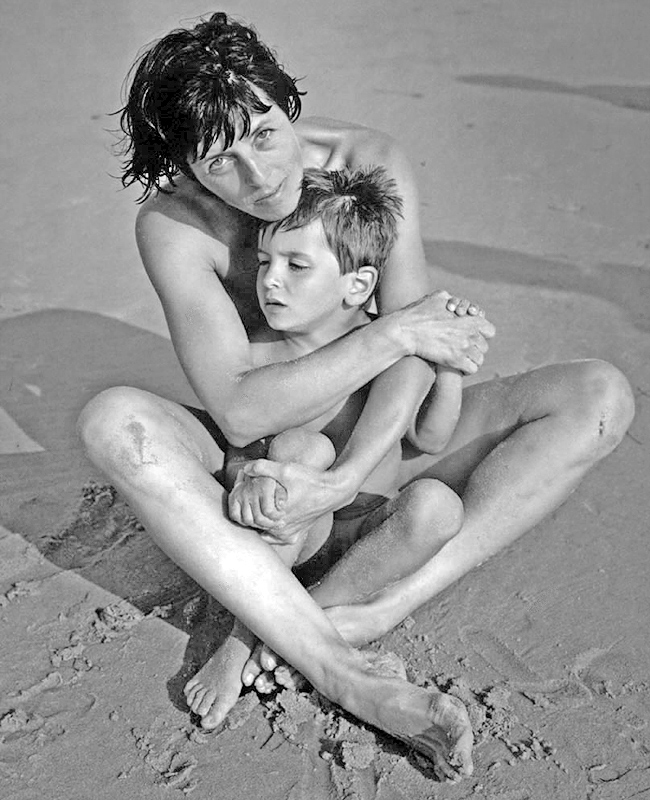
“Most of my friends wouldn’t like the camps because they’re too tame, too respectable, for them.”
David, who is a high school graduate but did not finish college, says he is still a nudist because he hates tan lines and it feels so good to be free of clothing. He speaks very easily about himself and his experiences as a nudist, and says that although most of his friends know about his involvement with nudism, it has caused him no problems among those he is close to. “Most of my friends wouldn’t mind going naked,” he says, “but I think they’d rather it be in a situation that was a little taboo. They wouldn’t like the camps, because it would be too tame for them, too respectable. Some of my friends go to Blacks Beach. That’s okay, because it’s still against the law.”
Back and forth between parents since he was five
David regrets the time lost away from his mother, and now feels the two of them are making up for years when they were kept apart. They are very close and thankful for the mother-son relationship they now have. “It was agony without my son,” she explains. “Especially the way he was taken. I can never forgive his father for that.” They were together until David was five, but then separated and she was unable to fulfill her role as a mother until he was nearly an adult. At this time, he has not spoken to his father for over five years.
Became disenchanted with nudism
When he was twelve, David became disenchanted with and disinterested in nudism. He resented the time in nudist activities that took him away from his non-nudist peers, and he went through a time when it was embarrassing for him to be nude in front of others. The most dominant factor in that reluctance, he says, was embarrassment over the physical changes he was going through at the time. He matured late and was small of stature.
His shyness was caused more by his lack of physical maturation than by actually being nude. He was ashamed of his size and his total lack, absence of pubic hair, since the other boys his age were much further developed than he. At the camps, David wouldn’t stay dressed, he would undress, but then he would get off by himself. He shunned the activities for kids his age. “I’d just kick back in the clubhouse and read.”
All this was changed when he was thirteen or fourteen and he was re-introduced to the pleasures of nudism by the JWSA (the Junior Western Sunbathing Association). He became active and involved once again with being a nudist and feeling good about it. He was chosen as a delegate to the JWSA convention when he was fourteen, and attended the six-day affair along with other nudist adolescents from all over the western United States. This was held in the summer of 1972.
Sex games among the children at the camp and at the convention
“Like all kids, we played spin the bottle, petted a lot, and played other sexual games. But actually my nudist friends were no more active or willing to explore sexually than the non-nudist friends I had during the school year. It was mostly kissing and petting and was not usually sexual intercourse, although there was some of that going on in both groups.”
David explained that sexual activity was easier to engage in “on the outside” — with non-nudist peers — because the rules are so strict at most of the camps they attended. The Swallows, for example, has rules against excessive bodily contact, and the children were very carefully supervised when at the camp. “We did manage, but it was more difficult at camps than at home with my friends from school.” The boys, he says, did participate in mutual masturbation at the camp, but adds that it also went on during his camping trips with the Boy Scouts.
During the JWSA convention in 1972, David told of some of the problems that occurred because of sexual activity among some of the delegates. There had been talk of an outbreak of venereal disease among some of the teens at the convention, but nothing was substantiated. “It was kind of like what happened at my senior-class picnic in high school, when some of the girls were supposed to have gotten pregnant the night of the party. Those were non-nudists, but it didn’t mean they were less sexually active. In fact, no one ever got pregnant or a disease at the camp or at a JWSA convention, at least not that I heard about.”
“I didn’t take up masturbation as a hobby until I was about twelve.”
Sexually aware since he was just beginning school, David gained sexual experience before most children stopped believing in Santa Claus. At eleven, he had his first sexual intercourse experience with a nudist girl who was also having her first attempt at sexuality. “It really wasn’t very good and we both thought it was overrated. I remember I didn’t even try again until I was about fourteen. She didn’t either, I’m sure. We had tried it, but sex wasn’t what it was supposed to be and we realized that evidently we weren’t ready yet.”
David didn’t think most of the nudist children he knew tried sex as young as he had, but he felt that from eleven to fifteen was probably the average age for sexual exploration in terms of intercourse with most of his friends, whether nudists or non-nudists.
As an adult, he has been very sexually active and has a steady girl friend with whom he has been intimate for two years. Marriage does not figure in their plans at the present, but neither one will rule it out as a possibility. David’s friend was present during the interview, and David showed no hesitation to discuss his sexual past or fantasies with her there. She also gave no indication that she had problems with any of the discussion.
David was more sexually active and experienced than any of the other subjects with whom we conducted interviews. For him, as an adult, sexual pursuits accounted for twenty-five to fifty percent of his energy. As a teenager, he told us, masturbation was his greatest sexual outlet. “Without it,” he added, “I would have died.” He said he’d masturbated nearly every day since he started in earnest — which was when he was in the sixth grade. “I didn’t take up masturbation as a hobby until I was about twelve,” he told us, laughingly. “But now I only masturbate about once a week. I don’t need to as much because I have a more complete sex life than I did as a teenager. I didn’t really feel guilty about masturbating except after one time when my stepmother caught me. Then for a while I wasn’t sure about how I felt or whether I should risk being caught again. I think the fact that she was the one who caught me had a lot to do with it. We didn’t get along.”
David remembered one other time when he felt uncomfortable about a sexual situation — although it was more physical than sexual — and it involved his stepmother again. For some reason he could not recall, he was nude and she noticed that he had begun to grow pubic hair. “She leaned over and announced to the whole group — we had friends with us — that I was finally beginning to show pubic growth.” He was mortified. His relationship with his stepmother was never a good one, and it suffered even more after that. Looking back on that time, he realizes that their difficulties existed mostly because of her inability to understand his feelings about being small and late in maturing physically.
“Is there such a thing as vagina envy ?”
We questioned David about his reaction to the warnings by experts (attitudes of the experts who warned) against exposing children to naked parents. When asked if he thought that a child surrounded by nudity would become preoccupied with his or her body and with the bodies of others, his answer: “If children have an interest in sex, their being surrounded by nakedness would be a stabilizing factor.”
He explained further. “It’s put out in the open. I feel it would be easier for a child to handle sex if it wasn’t made to be such a hush-hush, mysterious, dirty thing. People being together without clothes on (seeing people without clothes) isn’t a sexual situation in itself,” he told us. “Being surrounded by sexual activity would be hard for a kid, that’s true. But I suppose that’s what masturbation is for — an outlet.
“I remember my friends in school, when they would get a Playboy magazine or the like. They would go crazy. But nakedness did not cue my sexual arousal because it was a normal part of my life. I think it’s very good to be surrounded by (I see a very positive element to being surrounded) nudity and to become interested as opposed to preoccupied (that’s a value judgment) with your body and the bodies of others.
“I think the experts like Spock and Brothers get things blown out of proportion because they don’t understand their own sexuality. Like what Spock said about penis envy. I think most any boy envies his (all kids envy their) father’s penis size, and his strength as well as his height, weight and his deep voice. I even remember envying his ability to buy beer, but I didn’t get any emotional scars from wishing I was over twenty-one instead of fifteen.
“I think if you see enough kids with problems you start looking for explanations as to why they have them. You often jump onto the first thing that looks obvious to you without waiting to back it up with any hard research. That’s what I think they’ve done in this case attributed the emotional problems of a few patients to their exposure to naked parents.”
David smiled. “By the way, is there such a thing as vagina envy? I often wished I could have both.” He chuckled. “If not both, then a vagina rather than a penis.”
“Heck, David, you’re just greedy,” his mother volunteered from across the room.
“You’re right, and for selfish reasons,” he explained adamantly. “You can have multiple orgasms, and I can’t. It gets in the way many times, too.”
We observed the banter, aware that neither of the two was the least embarrassed by our presence. We feel that David’s candid conversation with his mother typifies their easy, relaxed attitude and that both reflect a secure satisfaction in their sexual personalities.
What About Incest and Open Physical Families?
David stated that he had never thought of his mother in a sexual way as Spock warned would happen in many cases. He had always felt that his mother was very attractive. But because they had not put themselves into a sexual situation, he reasoned,, feelings of desire for his mother in a sexual way (predicted by Spock and Brothers) had never existed. “I even had trouble thinking of my mother having sex with anyone. I do think people who put themselves in sexual situations with their kids are playing with fire.”
We asked if he knew of any incestuous relationship in the camps, and he said he was aware of two. One was a young girl whose stepfather got drunk and forced her to have sex with him, and the other was a girl who’d been having sex with her father but finally went to her mother because he was hurting her. Both men were kicked out of the camps and criminal charges were filed in both cases by the owners of the clubs. David reminded us of the high incidence of incest in non-nudist society. “No,” he said, after a pause, thinking over the question, “I don’t think nudity with family members increases the risk of incest. Quite the opposite, in fact.”
“It is far more provocative and sexual for a woman to be in a tiny bikini than totally nude.”
David discussed his feeling that nakedness in itself was not, for him, sexually stimulating, a sexually stimulating factor. “You have to have experienced casual, relaxed nudity with friends to realize that a group of people in a nude social situation behave in the same way as a similar group in a non-nudist situation. Without clothes a group, social situation is no different than other non-sexual situations. Actually, it is far more provocative and sexy for a woman to be in a tiny bikini or a see-through negligee — or a low-cut evening dress — than to be totally nude. That’s a fact. But you’d have to experience it to know it.”
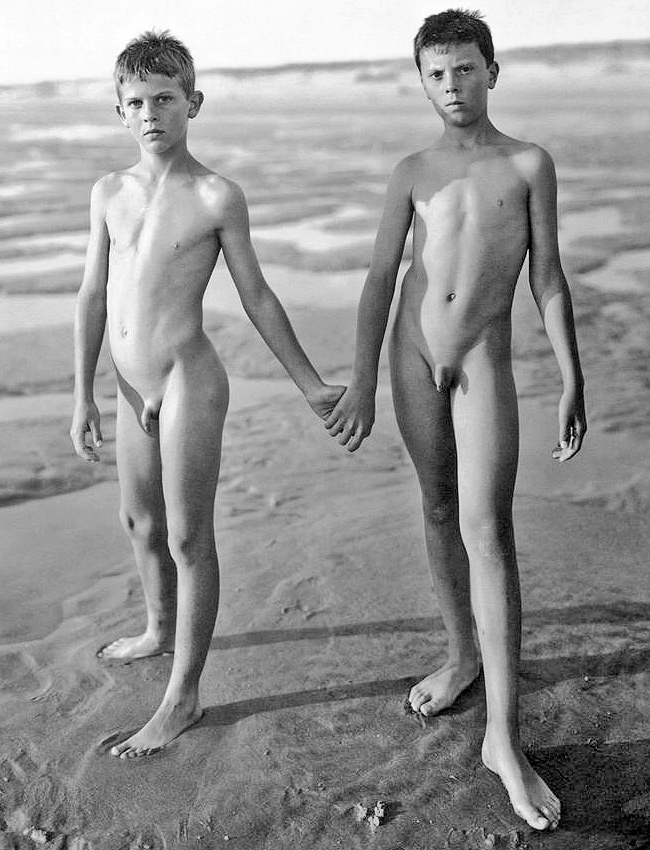
Is Being a Bisexual Somehow Related to Having Been a Nudist?
David was very candid with us about his being bisexual. He felt no uneasiness, he assured us, with that label. He did feel, however, that homosexual would be an accurate description also, simply because he has had sexual experiences with a member of his own sex. Those experiences were a small part of his total sexual personality, but David did not try to downplay their intensity or their level of satisfaction. “I have found that sex with either gender can be very satisfying and fulfilling.”
We asked him if his being a bisexual could somehow be related to his having been a nudist. He answered that, for him, he thought it probably was. He said that perhaps because being a nudist had helped him feel good about himself — who and what he was — it became easier for him to realize his sexual potential without guilt or shame. He pointed out how important it was to realize however, that he had many male friends who grew up as he did, yet did not consider themselves bisexuals. “They have not had sex with another male, other men, and they definitely aren’t even as sexually active as I am.”
David was one of the more sexual, less inhibited individuals we talked to in depth for the study. He represented, it seemed, a small minority even among the children of the nudist camps and open families. He was young, open and exceedingly positive about the effects of body exposure (nudism or casual nakedness) on the lives of children who were — in his words — “lucky enough to grow up in an open physical environment.”
Julie
“Although as I was growing up my parents would have friends over occasionally and we would all swim nude in our backyard pool, I don’t think you could classify us as a nudist family. Not at all. We happened to be very casual about nakedness — dressing, bathing, you know, family things — but we didn’t normally walk around the house or the yard nude. For us, it was totally situational. We felt comfortable with each other. Seeing my parents nude seemed to me like nothing abnormal or out-of-the-ordinary. It certainly was never stimulating sexually.”
Julie is a thirty-two-year-old housewife and mother who is married to an elementary school principal. Neither of them had been married before. She received a B.A. degree in English and earned one year postgraduate credit before teaching the fourth grade in Carpenteria, California for four years. Julie always did well in school, receiving A’s and B’s throughout high school. She was an honor student in college as well. Her husband, Brad, has a Masters in Educational Administration and grew up in a very closed environment, compared to the one Julie’s family presented. As parents, however, they both plan to raise their two boys (one five years and one who is just three months) in much the same way Julie had been raised — at least regarding physical family modesty and nakedness within the home.
“I always felt loved.”
When Julie was five years old, her mother and father took in her cousin, Donald, six months older than Julie, to live with them. He stayed as a member of the family for five years, and they came to feel more like brother and sister than cousins. The open, casual attitude the family had about nudity and family modesty continued during the time he lived there.
After Donald left their family, in fact when Julie was fourteen, her mother and father separated. They were subsequently divorced a year later. She talked about that time as a very emotional and difficult period in her life. She explained that she had always felt they were a loving family and the adjustment to a break in that love was more than she as a teenager could sort out, handle without distress. “It was really hard for me when they divorced,” she told us.
“My folks tried hard to show that it was not me they’d stopped loving, but each other. But it still took me a long time to get over it. When we were together, though (and I remember it vividly), I always felt very loved. Very wanted. I was an only child for most of my life — except when Donald lived with us — and I guess I was a bit selfish and self-centered because of it. I don’t find that a problem about me now. I guess I grew out of it as I got older. But I think that was part of the reason and partly explains why the divorce was so hard for me. I had all of them, all of the time, before they separated.”
A new father came into Julie’s life during her middle teen years and caused what she described as “very turbulent times.” Her relationship with her stepfather remained strained into her adult years and the openness she had once enjoyed within the family was gone. Although she was still open and casual with her mother, there was a difference — and she resented it. She disliked her stepfather for causing the change.
Julie’s mother worked as a school secretary at the same school in which her stepfather was the principal. Her natural father had worked for Northrup as an engineer.
As an adult looking back, she believes a major factor in her natural parent’s attitude about modesty was their involvement with a psychoanalyst when she was just four or five. “I think they were both influenced by the interactions they had with this individual and also with some of his other clients. I remember going to a couple of meetings with them. Because I was so young I didn’t understand what was going on, but I think that had a great impact on all of our lives.
“When my stepfather came into the picture he didn’t understand this openness at all. He had not experienced the same thing, and I rebelled at his lack of understanding and awareness. In fact, I remember my mother and my real father discussing how they thought they’d enjoy going to a nudist camp for a vacation. They even talked about it with some of our close friends. They never went, but that was the kind of thing my stepfather never could have even discussed. At least I felt he couldn’t. I think I became a sexual rebel then because of that — out of spite, perhaps.”
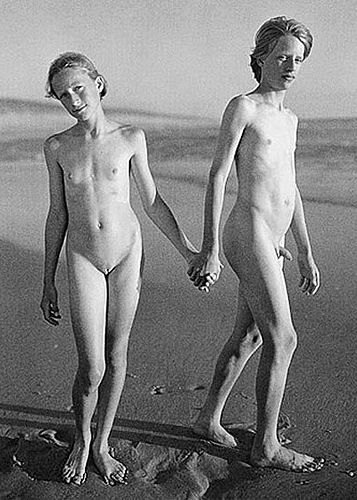
First Sexual Intercourse at Fifteen
Julie explained that she was introduced to sex as a teenager. It occurred early in her teen years, and she reacted by becoming sexually active and more than a bit rebellious. She feels that her wanting to have sex and involvement in sex at fifteen was her adolescent way of pitting, establishing herself against her stepfather. “It was my way of ridiculing his standards and rejecting his authority in my life.
“My mother and stepfather found out, and my stepfather really hit the ceiling when he became aware of my sexual activities. I wasn’t having sex with the football team or anything like that, but you’d have thought I had been — the way he reacted. I was only sexually active with the boy I was going with. But it was early in my life and it was regular, and to my stepfather, of course, it was very wrong. Like, not only a moral violation but a violation of trust, as well. That becomes really absurd in light of the fact that my stepfather tried to have sex with me a year or so later.”
She continued after a pause. “Did my early sexual activity cause a problem in my adult sex life? No. In fact, my experience has actually been helpful in my relationship with my husband. We began going together when I was eighteen, and that was when I realized how lucky I had been. If I had gotten pregnant before that, there’s no telling what turns my life would have taken. I went to my mother and asked for birth-control pills. I could have gotten them at the University health center, but I was more reluctant to go there than to my mother. That kind of explains our relationship. Even when she and my stepfather found out I was having sex at fifteen, I never felt I had lost her respect and love.
Masturbation and Pre-adolescent Exploration
Masturbation was always a natural act, a natural thing for Julie. She doesn’t remember ever experiencing any guilt connected with it. “I do remember,” she told us, “my mother telling me about a time when I was four and they had some friends over for dinner. We were all sitting at the edge of the pool and I was nude and sat playing with myself casually without knowing they were watching. She didn’t make me stop and neither she, my father, nor their friends appeared to think anything about it in a negative sense.
“I didn’t masturbate to orgasm until I had had intercourse, but it was common for me to masturbate even before I was dating. Today I bring myself to orgasm probably four or five times a month. I feel comfortable about it and always have. In fact, I think it’s good for me. My sexual relationship with Brad is very satisfying, and I think my ability to masturbate and know myself sexually is a big factor in that. I have control of my ability to reach orgasms and that removes total responsibility from his shoulders.”
Extramarital Sexual Relationships
Even though Julie was quite active sexually in early life, it has not caused her to look for sex outside of her marriage. She has never had sex with another person since her marriage to Brad. Swinging (mate swapping) is probably not for them — although she did say she feels more open to it than her husband probably would be. She explained that the problem seemed to her to be that too many people get involved in that activity because they are bored with their marital sex. “It’s hard to tell what I’d do,” she laughed, “but I know I’d rather not entangle us in something that may cause problems. The risks are far too great and the consequences far too unpredictable to gamble with our marriage or our sexuality. Sure, I’ve been attracted to other men, but I’m not tempted, and I’m capable of handling that with no trouble. I have done very well so far and I’m very confident of my ability with my husband.
“I have to work on communication — communicating my sexual wishes to my husband. But that’s an ongoing process. We enjoy oral sex, experimenting and varying our approaches and that gives us a very full and satisfying sex life. Why would I want to bring others into our lives and risk all that?”
Bisexual or Homosexual Experiences
Julie has had no bisexual or homosexual experiences, although she admits to homosexual fantasies on rare occasions. She explains that fantasies do play a part in her sex life but not a major one. Bisexuality she says, is not repugnant to her and neither is homosexuality. They have a good friend who is gay and have continued their relationship with him long after he came out and disclosed his sexual preference. But in her life there has been no homosexual sexual experiences and she sees little chance of having any homosexual experiences in the future. “I just don’t see how it could come up now. But I don’t find it disgusting. It’s a choice people have to make for themselves.”
Personal Involvements as an Adult
Since becoming a parent, Julie has gotten very interested (has developed a great interest) in the whole parenting process. She is determined to be as fine a parent as she can and to be as helpful as she can to others who have either become or are planning to become parents themselves.
She has helped organize and implement a program for prospective and new parents and has co-authored a book entitled Guide to Establishing a Parent Support Group in Your Community. The funds for publishing were raised by the group Julie helped create which is called PEP or Postpartum Education for Parents. A second publication she is working on is a reference guide for volunteers that will aid PEP workers in setting up and running the support groups the service offers. Julie’s family is a major part of her life. She recognizes that. More important, however, she finds added satisfaction in her life and in her involvement as a parent and a parent support person.
Looking Back on Her Open Family
When asked whether her childhood experience of regularly, commonly viewing her parents nude helped and caused her to develop any terrible guilts and frustrations regarding sex, Julie explained that the opposite was true. “Our openness and relaxed attitude about nudity did make me feel more comfortable about myself, my body and the bodies of others. I feel I was as a child, and am as an adult, less ‘obsessed’ with my sexuality and my body and the bodies of others than are friends I know who did not have the open experience I had within my family.”
Clara
Clara is a fifty-one-year-old historical research analyst at the University of California at Berkeley who was born in Chicago and has spent most of her life as a member of nudist clubs. Introduced initially to nudism at age ten, Clara considers her involvement, nudism to be a means of recreation and not a philosophy of life or “a religious experience.” When asked what she remembers as most pleasant about nudism when she was growing up, she said, “I always liked to walk around without my clothes on. That’s a pretty vivid memory for me. I mean it’s pleasant especially when the wind blows.
“During those times when I was ten, there was just my mother, my sister, and myself. My mother was a health-food true believer and it seemed to her to go along with the idea of nudism. Due to the way nudism was practiced in those days there was a strong connection between the two. Physical culture was a great influence in the beginning of organized nudism in America. We actually moved out to California to live in a nudist camp. We moved here to be at Samagatuma. We lived at the camp for seven years. Actually, mother was more interested in the sun than in nudity.”
“I feel sure there are other elements of life that are far more significant.”
Clara maintains that nudism was never a central focus of her life, just, as she puts it, “...a more comfortable way of sunning and swimming. I feel sure there are other elements of life that are far more significant.”
Her father — who died before Clara’s mother and the two girls moved to the nudist camp in California — was a doctor who leaned heavily toward natural cures and preventive medicine. Since he passed away when Clara was six, she could not remember much about him and was unsure whether he had had any interest in nudism. It seemed reasonable, however, for her to assume he did.
Because there were just the three of them, Clara felt she had a very close relationship with her mother right up until her death in 1971. “We worked together, always. We never were buddies, and as adults we never sat around and drank coffee together, but we worked together. That’s the way it was when we were kids, with my sister and me helping mother do all the work. We felt good about each other. So I guess we were close in that way. I’m just not sure I understand the word close.”
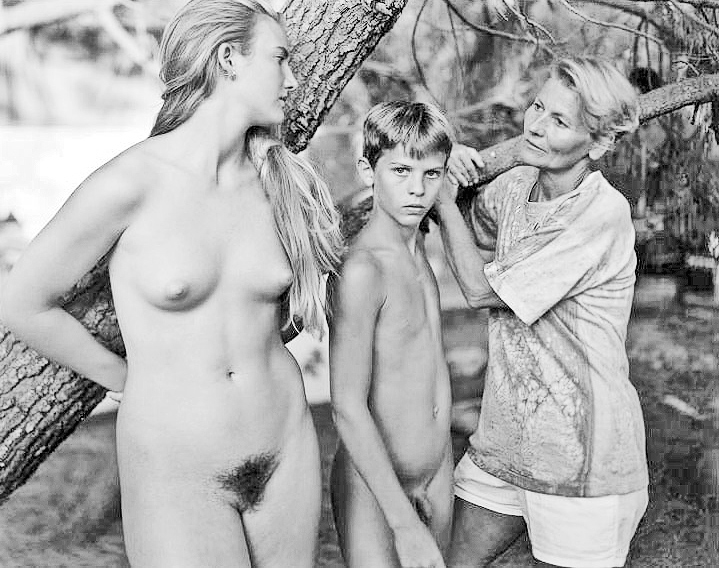
“It’s not a philosophy so you don’t try to make converts.”
Clara is the divorced mother of six children. She has been divorced for nearly two years. Her children range in age from junior high to married adults with children of their own. With her children Clara does not consider their family to be an open family in that they do not see each other nude unless they are at camp. Also, the older children do not continue, like their mother, to visit nudist camps. She says she’s not even sure they have an interest in nudism. If they don’t, she doesn’t care. She says it’s their life and they must live their own lives. “To us, nudism was just appropriate for recreation. It was never a philosophy, so you don’t try to convert those who don’t do it.”
Clara’s family is different from many of the nudist families we talked to because they seemed to consider nudism simply a recreation. Clara says she never felt uncomfortable about being raised in a nudist environment and never felt and distressed at raising her children with a recreation that involved going without clothes with others not in the family. She never felt disturbed of bringing her children to a facility where they would be nude in the presence of others.
Clara’s older friends do not really know about her involvement in nudism, but she says she doesn’t try to hide the fact that she is a nudist. She just feels it’s not worth (not worthy of) much discussion. “I think it’s a rather boring subject,” she explains. She has brought some of her friends into the nudist element of her life but that was because she says it seemed to her they would enjoy the recreation and not be offended by the nudity.
Clara could not remember ever feeling embarrassed at being nude in front of others when at the camps, except when she was in her early teens and was having her period. The girls wore shorts during their menstrual cycles and she said everybody knew by that she was menstruating and that was embarrassing to her. It seemed awkward to her — being without clothes but wearing something that made everybody aware of what she felt should be a very private time.
Because she grew up in the pre-sexual-revolution era, Clara says she was a regular “old-fashioned girl” when it came to sex. She began dating at sixteen — but not boys from the camp. She went out with boys from her high school but did not have intercourse until she was twenty-two. Mostly because she describes herself as pretty straight-laced, especially as a teenager.
“I really didn’t know about the other kids at camp, sexually. Kids came and went and you really didn’t get to know them well, I mean for those kinds of disclosures. We didn’t talk about sex. Times have probably changed, but I can’t imagine sharing that aspect of your life with just anyone.”
We asked her if she ever heard of orgies taking place at camp, and explained that an “orgy syndrome” (actual group-sex games supposedly participated in by a great many (a great deal of) children at nudist camps) is talked about by some “experts” as a danger of the nudist camp environment. Clara said she’d never heard of anything like that at all. “You’ve got to remember I came out of a puritanical era. I don’t know what it’s like today. I doubt if it’s that way, but I can’t say for sure.” She added that as a child she was in the camps in the 30’s and early 40’s and it seemed to her that nudist camps were the “squarest places around” even though people didn’t wear clothes.

Most of her high school friends were not nudists and didn’t participate with her at the nudist camp. Clara did tell one high school girl friend, with whom she has maintained contact over the years, about her nudist background. To this day, when Clara goes back to visit in Ramona, California (where she grew up), she and this friend go to a nudist camp together. “She takes her clothes off when she comes to camp, and she brings her grandchildren. We’re old ladies now. I don’t think she would have done that when we were in high school. It was just too foreign an idea — too daring.”
“It could have been a church camp.”
Clara laughed at the thought that a nudist camp is avant garde, remarking again about the conservative nature of nudists, especially in those days. “We did have a nice close group of people at the camp. It wasn’t because and didn’t matter that we were nudists — we could have been bridge-clubbers just as well. It was just that the camp was home away from home for a lot of people. I don’t think the nudist part of it is what created that closeness. I don’t think the nudist camp is what made it that. It could have been a church camp. It was just a way of bringing people together — different kinds of people.
“I don’t think the people on the whole were very intellectual. Very nice, wonderful people, but I did not grow up in a very intellectually stimulating environment. If I have one regret about my childhood it would be that. However, I don’t think that is related to the nudism aspect, either, except that that was the type of people our camp attracted. We were just a part of a very middle class, blue-collar social system.”
Clara explains she needs to accomplish much more intellectually. Her time, she says, may still come. “I am not totally happy with the way my life has turned here lately, but that was of my doing and not related to my spending some leisure hours without my clothes or seeing my mother naked when I was a child. Life cannot be reduced to such simple cause and effect explanations. It would be nice if it could be that way, then you could just eliminate those problems and things would be very easy.”
“We are surrounded by nudity at the beach, only it’s not total.”
We showed her the articles that claimed that group nudity caused children to become sexually precocious. She shook her head in disbelief. “I don’t think kids, or adults either for that matter, really care, after two minutes, whether you’re nude. I mean sex isn’t suddenly there because you are nude. I don’t think kids after just a couple minutes pay any attention to whether they’re nude or not.”
We asked her about the attitude, the assumption that a child who is surrounded by nudity will become preoccupied with his or her body or with the bodies of others. She didn’t think that it made any difference and that nudity had anything to do with such a development. “We are surrounded by nudity at the beach, only it’s not total. Nudity can, however, be very stimulating if you are in a sexual situation.”
When asked about penis envy, she smiled and explained that she was “...a little girl who always thought penises were pretty funny looking. I couldn’t imagine why anyone would want to have one and would envy having one. How could you envy anything like that? I think I was lucky that I wasn’t so cursed. Women are much more pleasant-looking than men, as far as genitals go.”
During our interview, we asked Clara about how she reacted to certain sexual topics as a child. Here are some of her answers: Masturbation: “I can’t really recall thinking about it as a child at all.” Incest: “When you don’t think about sex you don’t think about incest.” Sexual Intercourse: “I’m not trying to be difficult, but it wasn’t something I thought about until I was maybe in my early teens. Then I don’t recall ever thinking it was nasty or dirty — just boring.” Homosexuality: “It was just a word to us, nothing more.”
She felt non-nudist children were more apt to be preoccupied with sex. “Once, when I was a teenager, I took a job caring for two little girls during the day and evening when their parents were working — this was during the war. I lived with these two little girls, so I took the school bus home with them every night and stayed with them. Well, those two children, who were in fourth and sixth grades, talked about sex all the time. My goodness, I was shocked. I was twice as old as they were, almost, and I never heard such chitter chatter. I couldn’t imagine that anyone would be interested in that, let alone talk about it to others.
“They were non-nudists. Perhaps non-nudists are more preoccupied about it, with sex. I don’t know. Maybe they weren’t normal.” She paused, thinking. “I don’t think they were abnormal — just sexually talkative. Maybe I was the strange one, but I didn’t think about sex, and if my friends did they didn’t talk to me about it.”
We asked if she considered nudity a sexual stimulus. “I don’t think it is, but I don’t think it’s a turnoff either. Because the other way around is to say that people who have been raised around nudity can’t be turned on: that they don’t have any stimulus left, that they’ve lost their sexual interest. I don’t know if that’s true, but I think it’s possible that they need other stimuli, such as affection. Which may be more difficult. Which may be harder to come by,” she said, laughing.
“It’s probably better for kids now than when we were growing up. In my time, people got married because they were physically attracted to each other. They were so eager to have sex they didn’t bother to get acquainted on other levels. Getting married was the only way you could express that feeling of attraction. They were so physically attracted that they got married. Today, kids don’t have to get married to have sex, and so they don’t have to marry the wrong person.” She laughed. “I have come a long way. I’ve been educated by raising six kids.”
“It’s not going to save the world.”
Clara, a democrat politically, does not believe and agree that the Equal Rights Amendment will take rights, privileges away from women. She considers herself a feminist. She does not see nuclear power as safe enough to rely on and expects other fuel sources to be developed. Her stand on equal rights follows a constitutional tack, but she doesn’t think all people should actually be treated equally. “Some need more help than others,” she explains.

Religiously she doesn’t believe in an anthropomorphic personal god or in many of the dogmas that are accepted by conventional religions. Most of all, she is firm in her conviction that being naked, not having clothes on or being raised a nudist has neither a profoundly inherent good nor a malign, sinister, bad effect on a child’s development, on the personality development of adults or children. “I don’t think being raised a nudist spared me any sexual hangups. But neither did it cause any. I am very sure there are other elements of life that are far more significant.”
Mark
When we first talked with Mark he was thirty-three and had two children of his own. Both of his children have visited nudist camps regularly since they were born. His wife, Betty, was a member of the camp when they met. At the time, her family was relatively new to nudism. Her parents had been members for two years, and she was a twenty-two-year-old college sophomore when Mark helped her father clear brush from around their trailer at the camp. Neither Mark nor Betty describes it as love at first sight, but neither of them had dated much, and both were rather timid around the opposite sex.
“I was really inexperienced and naive when I met Betty,” Mark says. “I thought she was so worldly and sophisticated. Funny thing is, she thought I’d really been around, sexually. Even Betty fell into the trap of thinking that nudists were all sexually liberal. But we were both virgins when we married.
“I’ll never forget thinking, ’How am I going to keep up with a great-looking woman who has been off to the University with all those guys around her?’ And all the time she was wondering about the ’sex games’ nudist kids are assumed to be playing behind the recreation center. She was sure I was sophisticated, sexually. Hell, at our camp, coed canoeing was about the sexiest thing we ever did.”
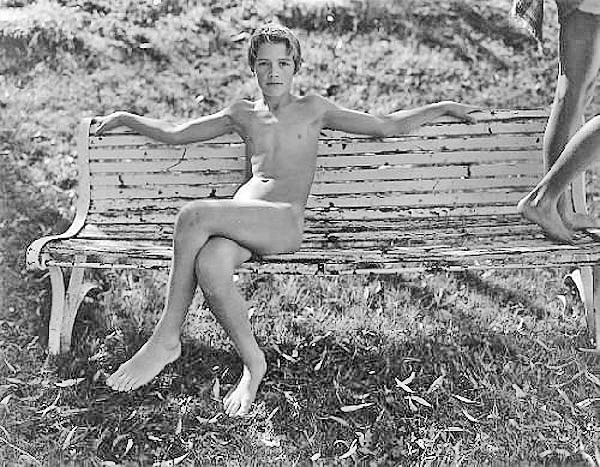
Always a Nudist
Mark has no recollection of a time when he was not going with his parents to nudist camps. He was actually two years old when his family joined a club in the Pacific Northwest, and the first birthday party he remembers was held on the grounds with fourteen naked three- and four-year-olds wearing only party hats and vanilla frosting on their faces.
Carla
Carla is an exotic dancer and an unmarried mother with a three-year-old daughter and an eighty-pound labrador retriever to feed. Her father was a construction worker in nearby San Bernardino and her mother coordinated home parties for a housewares company. Carla was on her own from the time she was eighteen. Like her mother, she was unmarried and pregnant at nineteen. Her mother married her father in her fourth month of pregnancy, but Carla never married. She dated the father for about three months, but never told him she was expecting a child. She has no idea where he is now.
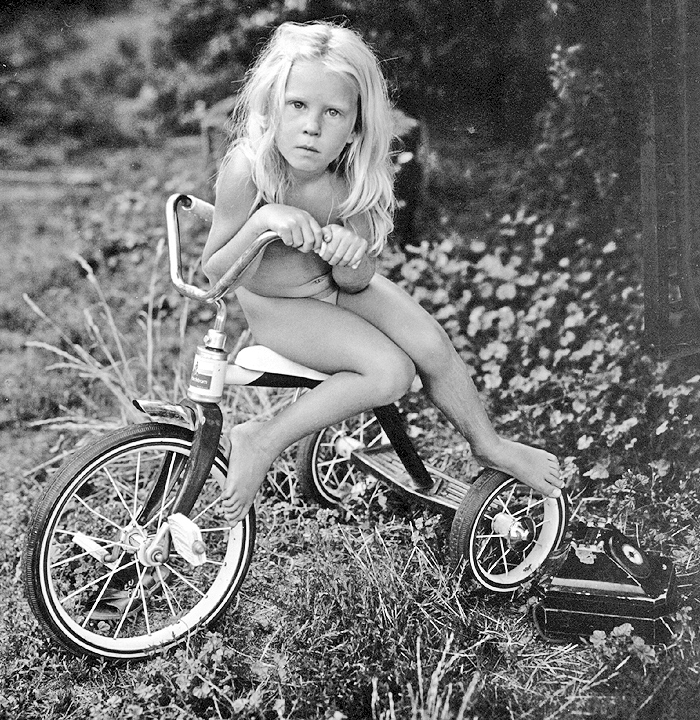
A Casual Attitude about Nudity
Carla says that when she was eight her father talked her mother into going to a nudist camp. She doesn’t know if her mother ever fully accepted it but they went regularly and Carla enjoyed camp. She took part in nude beauty pageants from the time she was fifteen. She was third runner-up in the Miss Nude World competition and posed for art classes at a local college campus when she was seventeen. Her casual attitude about posing nude in front of people made it easy for her to become an exotic dancer when she grew older, and that provided her with income. But it also opened for her an avenue of acceptance when she was a teenager.
Carla was sexually active by the time she was fifteen and remembers her first intercourse when she was thirteen. “I guess I got started pretty young,” she says. “Sex was never a big deal with me, but I always seemed to end up on someone’s bed. I think I liked getting there more than I liked the actual sex. I mean, the guys always treated me really good if there was half a chance we’d be making it pretty soon. It’s funny. I never got screwed at camp but I sure let a lot of guys play doctor.”
Philip
Philip, an actor, grew up in nudism. His mother was widowed when he was three, at which time she read an article by Margaret Mead that made her think it might be a good idea to visit a nudist camp. She had no more than a high school education, and she worked as a teller in a bank to support herself and her only child. She joined a nudist camp because she liked the idea of her son feeling good about his body, but she didn’t have enough confidence in what she was doing to tell her parents or her friends about her new activity.

She had never been nude around others and admitted that she found it difficult, that first time, driving out to the camp in New Jersey. But she soon made new friends at the camp and, eventually, her parents “just found out” about her nudism. Did they ever accept it? “Nope,” she responded, smiling.
Grew Up in Nudism
Philip had no trouble with social nudism when he was a small child, but when he entered high school and developed an interest in the theater, he began to drift away. His new friends were not nudists. In fact, he stopped going entirely when he was sixteen and did not return to social nudism (except when pressured by his mother) until he was twenty-one.
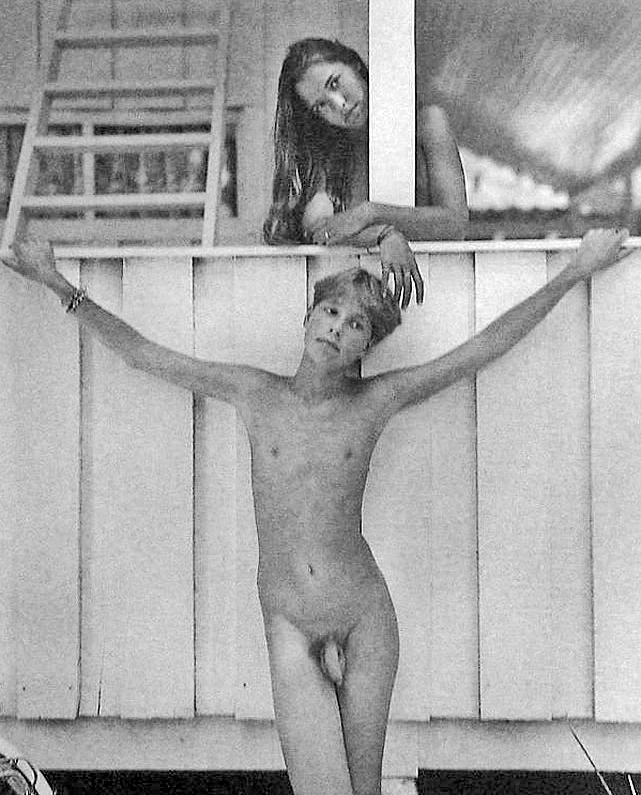
Needed a Calm Place
He explains his return as follows: “Mom never urged me to get back into nudism, except for an occasional visit. But when I started acting — or trying to be an actor — I needed a calm place in my life, away from the rigors of the business. Camp presented so many wonderful memories that it was natural for me to return there. I really don’t think of my years away from nudism as ’dropping out,’ but just as a period when I was too busy to go. I just took a break for a while.”
Philip doesn’t date much and believes that his career plans make it difficult for him to lead a normal social life. “I wondered for a while if I was gay, and I know many of my relatives still think I am. But I’m not. It’s just that the passion and energy I put into acting leaves little left over for thinking about sex and exerting the effort to get it. Asexual — that’s how I’d describe myself. I don’t know, maybe it will be different later on.
Philip is always amazed when he meets someone who won’t go to a nudist camp or a nude beach. In and around the theater, he says, people just aren’t uptight about their bodies. “The dancers wear practically nothing, and actors change in and out of costumes without thinking about whether others are watching. Being nude socially seems a natural extension of exposing yourself to an audience as an actor. It’s part of our profession. We use our bodies as tools in our trade. So we feel good about our bodies. We have to feel good about the tools we rely on.”

Allen
In his second year of law school, Allen met Sandi and took her to the nude beach near Santa Barbara. Sandi was timid about going nude, so she only removed her bikini top, but Allen went entirely nude even that first time with her. He couldn’t remember ever going to a beach where suits were required. The idea seemed incongruous. Why would anyone wear clothing when one wanted to swim or bathe in the sun?
Allen’s father is a doctor — a general practitioner with an office in a small town neighboring on Santa Barbara, and his mother is a teacher in the Santa Barbara school district. Allen first ran naked down the beaches of central California when he was four, although before that time the family often sunbathed nude in their back yard which overlooked downtown Santa Barbara and the Pacific Ocean. None of his family has ever been to a nudist camp. The beaches were too close, and the nearest nudist resort was over two hundred miles away. He isn’t sure that they’d have visited a camp even if it had been nearby. “The beach was my parents’ thing — our therapy place.”
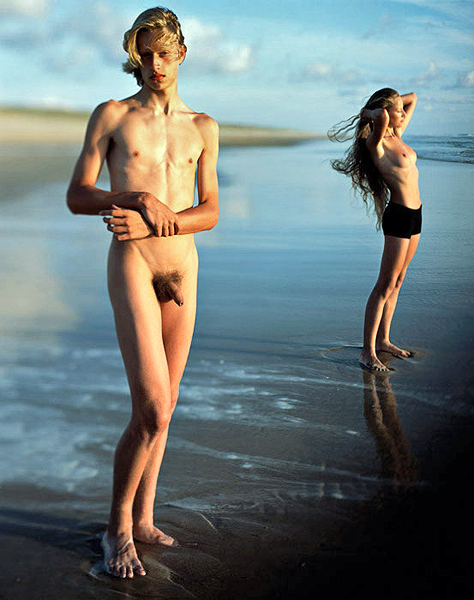
“I can’t believe I was ever so uptight about other people’s skin.”
Since the first time he talked Sandi into going to More Mesa beach, Allen has seen a change in her acceptance of a “natural” beach where everyone is nude. “At first Sandi didn’t want to go at all,” Allen remarked. “Finally, she took her top off and enjoyed the freedom, but for almost a year she wouldn’t admit she liked it. I can kid her about it now, but I sure couldn’t then.” Sandi explained. “I thought it was a little perverted. I really felt Allen just wanted to go and ogle naked women. I was even a little angry at him for not caring if other men saw me without clothes on.” She smiled in recollection. “I didn’t know where to look that first time, so I spent most of my time just looking down at the sand. A friend of Allen’s came over to talk to us and I didn’t even look at him. I’m so different now. It amazes me how far I’ve come. I can’t believe I was ever so uptight about other people’s skin.”
June
Nudist camp helps her cope with the problems of being a single parent
June, a widowed mother of four and a hospital administrator, finds that the time she spends at the nudist camp away from her duties helps her cope with the pressure of her job and the problems she faces as a single parent. At the nudist camp, June and her four teenage daughters all have time for themselves. There are plenty of activities for the girls, and June can relax with friends or lie in the sun and rest. “Ah, peace,” she sighs.
Her mother and father were both German immigrants. They moved to America with their two children and their European attitudes toward nudism. June’s brother died when she was three, and shortly after his death the family joined a nudist club near their home. She realized later that her parents, felt the need for a body of good friends and some interesting activities that would help them overcome their grief.
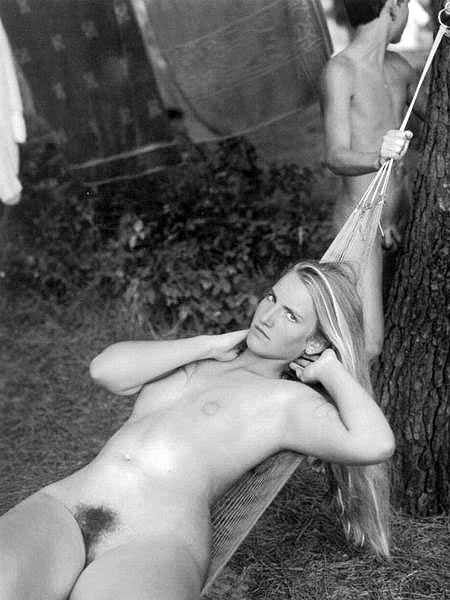
“I assumed my nudist days were over.”
When June married, she assumed that her nudist days were over. Her husband was an accountant in the East. When their second daughter was born, he went to work for a company in California and they moved across the continent to San Diego.
June never discussed her nudist background with her husband, but one day he came home with a brochure from the Swallows Sun Club, of El Cajon. “I still have to laugh when I think how shocked we both were that the other one would consider being a nudist.
“Belonging to a nudist club and going to camp is no different from being in any other group of people. Being without clothing becomes incidental to other more important factors. We do the same things everyone else does — swim, play games, talk — except we don’t wash as many clothes in good weather.”
Carl
“If you want to know, anybody who wears clothes to swim is crazy.”
Carl is a sheetmetal worker who doesn’t mince words. “I started in nudism because I hated clothes. Always did. I got that attitude from my father, I guess. He hated clothes and so did I.”
Carl’s wife, who calls herself a domestic engineer and Carl “a pain in the engineer,” at first said she would never go to a place where people “paraded around with not a stitch on.” But Carl would not take no for an answer. She has been a nudist for twenty-four years.
All five of Carl’s sons are nudists, although the oldest dropped out for a while during college. Three of the boys are married and are bringing up their children as nudists. Carl is proud to say, “All my boys know how to raise kids: just like I did, naked and strict.”
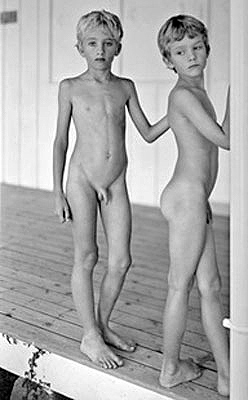
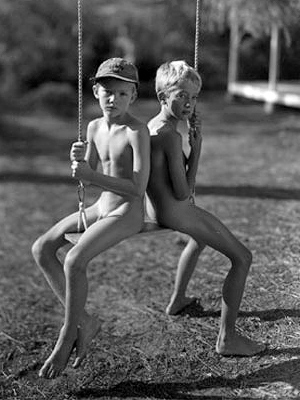
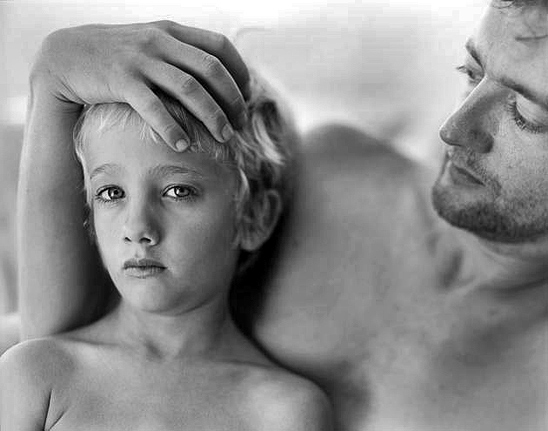
Jake
One of the people we talked with, a twenty-nine-year-old supervisor with the Department of Public Welfare, told me that being raised a nudist helped him feel comfortable with himself. He said: “Since I believe nudism created (was an effect of) a liberal and understanding background for me, in my family and was occasioned only by opportunity, it is impossible to isolate nudism as the only cause. However, I can conclude that it has helped confirm my emotional and physical confidence and comfort with myself as a person.
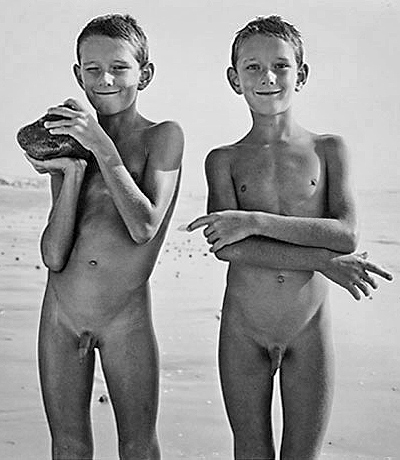
“I am ... immediately apologetic for having caused embarrassment.”
“In non-nudist situations — when I am unexpectedly surprised and confronted with the prevalent bathroom, pants-down paranoia — I am aware of not being at all personally embarrassed, but rather immediately apologetic for having caused someone else embarrassment. Physically, the extreme variety of body shapes, textures, and features exposed in nudist society would, I believe, help anyone be honest about their own physical characteristics, if not actually comfortable.
“As usual, most childhood memories have — for me — been lost to generalities. Consequently, it has been satisfying to watch my daughter — almost four — in her nudist experiences. As with me, I feel that, for her, nudism is an incident consequential to her personality and our family life. For her, so far, the results have been the same as they were for me.
“I have read articles by doctors Spock and Brothers, among others, about nudity and children and, naturally, I hope that the results of this survey will to some extent balance that influence. I can appreciate and normally respect their right to their opinions, the logic and inferences of their opinions, but, by (because of) personal experience and observation, I disagree with what they say.
“I tend to conclude that nudism is not a causative factor in developing the attitudes characteristic of nudists. However, I can recognize that as I have been a nudist since a pre-natal period (my mother was pregnant at the time of her first nudist experience) I am not really in the best position for an unbiased, uninfluenced conclusion.”
Edgar and Louise
Parents of Four Grown Children
In Tucson, Arizona, we met a family with four grown children, and they agreed to become subjects for the research. The eldest, whom his mother describes as a “super student,” is twenty-four and preparing for medical school entrance examinations. In high school he graduated with honors and went on to make the dean’s list each year of college. He has a BS and an MS in biology and plans now to go on to medical school. He is married to a teacher who did not have a nudist background but who is now also a member of Jardin del Sol, a nudist camp in Arizona.
Edgar and Louise’s second child, a girl, is now twenty-two. She was blinded by a virus in the second grade and lost some time with her studies because of it. After regaining her sight she spent two summers in summer school to catch up. She has been an above-average student, but did not receive the honors awarded her older brother did. She has three years of college with a major in art and is currently married to a pilot in the Air Force. They are expecting their first child.
Her husband is not a nudist and has no interest in nudism. When she visits her parents, she goes nude around the house and at the pool. She would like to raise her children as nudists, but she realizes that her husband does not feel this way and it is not the most important consideration in her life.
The next child is a boy who is now twenty-one. He was very popular in school, although for him it was a social involvement more than an academic one. He was an average student but an above-average athlete even though he was always the smallest to compete. He now stands nearly five feet tall and in high school was the state wrestling champion (at ninety-eight pounds) for two years in a row. He is a “super volleyball player” and competed in gymnastics (which, in Latin, means naked exercises).
He chose not to attend college, working, instead, as a carpenter. He still is a member of Jardin del Sol, as are his parents, and he plans to raise his children, when he marries, as nudists.
The youngest child is eighteen. She is presently attending college, where she is doing very well. She is much more social than either of her brothers or her sister. Although she does go nude when at her parents’ house, she is not interested in nudism and does not tell any of her friends about her parents’ attitudes or of her experiences as a child raised in nudism. Her mother describes her as “more interested in the opposite sex than any of the other children, but a super student like her oldest brother.” She says she may or may not raise her children as nudists, depending on how her life goes from here.
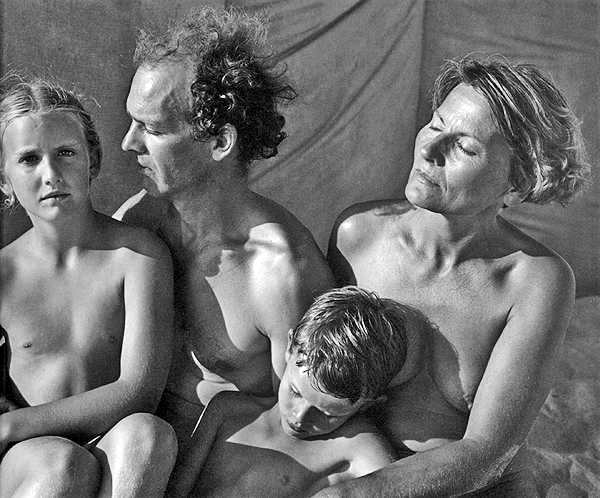
“Our children are all good citizens....”
Edgar and Louise are extremely proud of their children. “Our children are all good citizens, interested in ecology, zero population growth, physical fitness, and our family,” Louise explained. “We’ve had no problems from any of them. We sure have been lucky!”
Sue
Sue, a twenty-nine-year-old college sophomore, told us that her family had always been very open with one another. She had grown up and lived in Orange County until she was fifteen, when her natural father and stepmother moved to the central California area. She has five siblings — three stepbrothers and two natural brothers. She describes her family as always being very close — extremely open and natural about both sex and nudity.
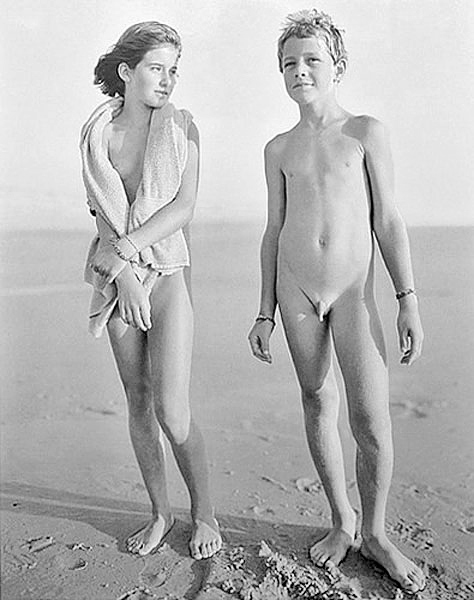
“Nudists and Motorcycles Ahead....”
“When we moved to Arroyo Grande it was for the kind of privacy we wanted as a family. My father, though, was the real driving force behind our move. He hated being ’cooped up’ in southern California. There were too many people and too many things that dictated the way you had to live. When we moved to this area, the first thing he did on the farm was put up a large eight-foot fence around our homemade swimming pool and make a sign for the front gate. The sign read: ’Nudists and Motorcycles Ahead. Proceed at Your Own Risk.’ We had over fifty acres, so the house was a long way from the road.”
Sue told us that her father spent very little time completely dressed, as did her oldest brother. The rest of the family, were not as comfortable with being nude all of the time. “The rest of us were not at all shy about being nude in front of the family and we would always swim or sunbathe nude, but my oldest brother and my father did not like to have clothes on at all, if they could help it. That’s why my mother and father bought the farm. It was theirs, and what we did there was our business.”
Even though her father put up a sign that said “Nudists Ahead...,” hers was not a typical nudist family in that they did not belong to a nudist club and they did not socialize with other families who thought as they did. They were actually, as she put it, “A very private family that did most things together as a unit.”
“The first time I had intercourse, I didn’t want it at all”
Sue talked of sex play with her brothers and said that, although it was very common, none of the sexual games led to intercourse. Her first complete experience that led to intercourse occurred when she was fourteen. It was not a positive experience for her. At that time she pulled away from both sexual activities and family nudity.
“The first time I had intercourse, I didn’t want it at all. It was with one of my brothers’ friends who started to get aggressive with me at a party. He’d been drinking and, although I did not want to admit it then — both because of my brother and because he had been drinking — he actually had raped me. I knew him from seeing him around my brother, but he had never been with us at the house when we were all nude. I was really frightened and bitter about it for a long time after that. In fact, that really changed things concerning nudity for me for about three or four years.”
Her life now shows no effects (little signs) of that withdrawing from physical openness and sexual enjoyment. She spends a good deal of her time at a nude beach near San Luis Obispo and describes her at-home, around-the-house attitude as “very casual, wearing as little as the weather will allow.” Very often she says she and Jim — the person with whom she has lived steady for over two years — “will only put on clothes if someone comes to the house to visit. And even then it completely depends on who it is. Most of our close friends are as comfortable with being without clothes, with nudity as we are.”
“Most of our close friends are ... comfortable without clothes....”
I asked Sue if she ever regretted being raised in a family where the members were so open with one another. She explained that she never had, even during the period following the rape, when things were very difficult for her. She said that today it was for her something she was very thankful for. Now she is very thankful for her nudist background.
“I really think that both my parents gave us a great deal to build on as adults. Nudity, the nudity thing was kind of incidental. The real issue was the closeness we felt as a family and how good we were made to feel about ourselves. We felt good about ourselves — our bodies, our self-worth, and our abilities. Oh, I do think it was important for us to be able to see each other growing up and to experience the changes in one another visually. I mean, seeing our bodies as they changed. I think that’s healthy. Maybe it still could have happened without the nudity. Many families are close without it, but for me it added another dimension.”
“Oedipus complex? Never!”
We asked and wanted to know if Sue remembered any feelings of being attracted sexually to her father, or experiencing feelings of rivalry with her mother. About her father she said: “When I was three I wanted to marry him, when I was nine I loved to hold his hand, and when I was sixteen he made me feel very much loved. Now I can talk with him about my problems and get great comfort from him. But sexually? No. Sexual attraction and sexual needs arise, come from a different kind of intimacy. We weren’t sexually intimate just because we were nude together.”
Sue is working towards a degree in Natural Resources Management and plans to transfer to California Polytechnic University at the end of her sophomore year. She still considers her family a very close one and says she and her friend Jim spend a good deal of time with them when they can.
Her schooling through high school was rather typical. She was a popular girl, involved in sports, student government, and cheerleading. In high school she was the junior class princess and homecoming runner up in high school. Her grades were good, about average, with a point average of 3.6 for four years of high school. In college, she has maintained a B average but says she has to work harder now than ever before to keep good grades.
She describes herself as “a woman about to apply the basics which an uncommonly aware mother and an open and caring father gave to her as a child.”
Jesse
Robert Mapplethorpe had an agenda: “Children are sexual beings,” he said, “but it's an area that makes most people feel uncomfortable.”34 His emergence in New York in the 1970s coincided with two simultaneous, but unrelated events that would prove essential for his subsequent career: the rise of a market for photography as a fine art and the explosion of punk and gay cultures. Originally trained in painting and sculpture, Mapplethorpe gravitated toward photography, first making erotic collages in 1969-70 with images cut from magazines, then creating his own photographs using a Polaroid camera. Within a few years he was exhibiting erotic male and female nudes, still lifes of flowers, and celebrity portraits, all made with a large-format camera. By the late 1970s his work had developed into its mature style — elegant, minimal black-and-white compositions carefully staged and lit in the studio, and often characterized by the explicit homoerotic themes for which the artist would eventually gain notoriety. Mapplethorpe's photographs reflect his intense interest in and knowledge of the history of Western art. The rigorous formal language employed in all of his pictures reveals a search for idealized form that developed from a variety of influences, including classical sculpture and the work of photographer Edward Weston.
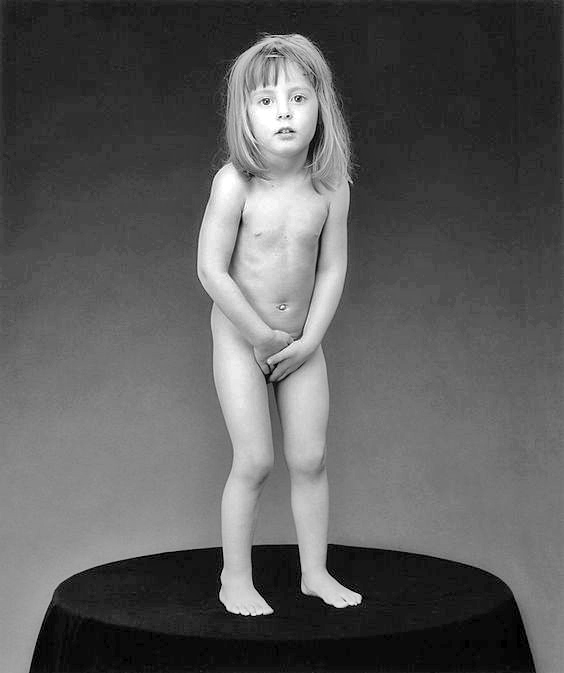
Eva Amurri, 1988
Mapplethorpe frequently made portraits of children. He took a number of photographs of the children of friends and acquaintances. The offspring of friends and society figures whom he also photographed, Mapplethorpe's child models appear variously clothed and nude. He emphasised their innocence and lack of self-consciousness. In two early portraits from 1976 Jesse McBride and Rosie, his young subjects are sympathetically captured in natural, nonstudio environments and in poses that appear relatively spontaneous: five-year-old Jesse is perched nude atop an armchair in his mother's SoHo apartment, while three-year-old Rosie sits on an ornate garden bench, a propped-up knee inadvertently revealing her lack of underpants. Both children innocently face the camera without being self-conscious about their nudity. Most of Mapplethorpe's portraits of children were made within the more controlled conditions of the studio, stripped of settings and props and rendered in a rich palette of blacks, whites, and grays. Unlike his eroticized male nudes, the photographer's images of children are never cropped, nor are sections of their body blown up into fetishistic details. Their bodies are aestheticized, but not as sexual beings; rather, in works such as Melia Marden (1983) and Eva Amurri (1988), they resemble the eternally childish putti of classical and Renaissance art.35
I look particularly angelic
In Mapplethorpe’s photograph, Jesse Luke McBride (born 1971) is naked and he has leaped onto the back of a chair. Clarissa Dalrymple remembers the day her close friend Robert Mapplethorpe arrived at her tiny downtown apartment, as she had asked him to, to photograph her son. “In or about 1976, I asked Robert, being a close friend and top photographer, to take a photo of my son, Jesse McBride... I expressly authorized and commissioned Robert Mapplethorpe to photograph my child and to include these photographs for use in exhibitions, publications, or otherwise.” Jesse was an energetic 5-year-old then, dashing about the kitchen without his clothes on, “being a bit of a nuisance, not sitting still enough.” It took Mapplethorpe, who'd known Jesse all his young life, half an hour or so to coax him onto the velvet chair next to the refrigerator and take the picture he had in mind.

When Mapplethorpe brought Dalrymple the print, “I thought it was beautiful; I've never had any doubts about it,” she says. “I believe there’s nothing more magnificent than repeating childhood patterns. You look at anybody’s life, and when it isn’t going right, it’s their nursery behavior.” She's hung the print above the sofa in her apartment. Jesse's father, film director Jim McBride, displays another print in his kitchen in Los Angeles. “I think it's gorgeous, partly because my son is so gorgeous,” he says. “We were shocked to turn on 'Nightline' one night and see our child, slightly censored.”
This photograph of a nude boy, taken in 1976 and titled “Jesse McBride,” is one of seven Mapplethorpe photographs that have led a Cincinnati grand jury to indict the Contemporary Arts Center and its director on obscenity charges. The fact that the child's parents, and the parents of other children whom Mapplethorpe photographed, were friends who commissioned and consented to the photography didn't become an issue in the case.
The relevant Ohio statute forbids the possession or viewing of “any material or performance that shows a minor who is not the person's child or ward in a state of nudity,” but makes an exception if the parent has consented in writing to the photographing and to the manner in which the material is used. Lawyers defending the museum have secured affidavits from the children's parents, but attorney Louis Sirkin said he could not discuss when or how he planned to use them.
Two images of children in the Mapplethorpe exhibit, both deemed obscene along with five prints depicting sexual activity among adult men, have drawn much of the fire from the outraged Citizens for Community Values. The group has spoken of the “possible harm” of photos “depicting the genitals of prepubescent children”; at a news conference in Cincinnati a local business publisher said the pictures constitute “abuse of children.”
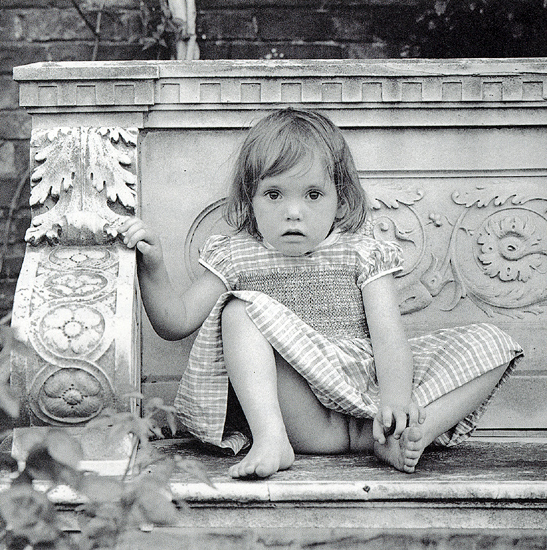
The other child portrait, taken the same 1976 year and alternately titled “Rosie” or “Honey” in different shows, is of a 4- or 5-year-old girl seated on a stone bench, her upraised knees revealing that she is wearing no underwear beneath her dress. This is the picture that particularly offended Sen. Jesse Helms (R-N.C.) and at one point led him to tell a reporter, “I'm embarrassed to even talk to you about this. I'm embarrassed to talk to my wife.” Jesse Heims says that Robert Mapplethorpe's two photos of children, Jesse McBride and Rosie, “promoted child molestation.” Pat Robertson called them kiddie porn. And the Citizens for Community Values fulminated on “the children with their genitalia exposed.” Yet Rosie's parents, who do not want to talk to the press, were also Robert Mapplethorpe's longtime friends, as was their daughter, now 18.
In New York, Mapplethorpe's art world friends often asked or permitted him to photograph their kids and, in the case of well-known painter Brice Marden, recommended him as a portraitist to other parents. In these circles, 5-year-old Jesse was as likely to be photographed naked as clothed. Brice Marden and his wife, Helen, matter-of-factly keep a Mapplethorpe catalogue open in their home. They took their daughters Melia, now 9, and Mirabelle, 11, to the 1988 Mapplethorpe retrospective at the Whitney to see the photo he'd taken of Melia – also unclothed – when she was 3.
A gulf of mutual incomprehension separates this community from conservative groups in Cincinnati, where people offended by those same portraits accuse the photographer who took them of exploiting children who'd grown up seeing him at family dinners. Mapplethorpe's friends would find the whole situation absurd, almost comical, if it didn't make them so angry.
“It isn't a pornographic photograph; I don't know what they're talking about,” says Dalrymple, director of the Petersburg Gallery in SoHo. “From Robert's point of view and the child's it's a horrifying way to interpret something.”
“I think these people are nuts,” says Jim McBride. “I wish they'd leave everybody alone to see what they want to see. But if there's going to be a fight, I'm happy to be in the middle of it.” An independent filmmaker turned Hollywood director – his movies include “Great Balls of Fire,” “The Big Easy” and “Breathless” (for which Mapplethorpe did the still photography) – McBride was living in California in 1976. (He and Dalrymple didn't marry: “We were hippie artists,” he says.) But McBride says he certainly would have consented to having their son, who lived with him most of the year and spent summers in New York, photographed by Mapplethorpe. “I knew him to be a terrific photographer and a friend of the family. I didn't see anything threatening or disturbing about it at all.”
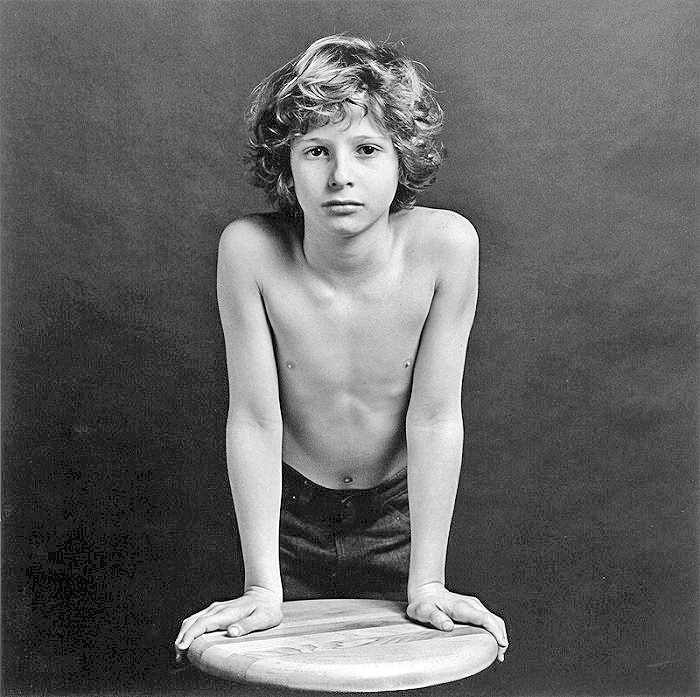
Sebastian, 1980
Helen Marden, for whom Mapplethorpe was “literally the boy next door” on Bond Street, is equally outraged. “No way are these obscene,” she says of the photographs. “How many children in America live in poverty? What's obscene is what happens to women and children in this country and how it's tolerated. And then to pick on this ... what an easy target, these elegant photographs.”
However notorious the photographs have become – in part because of Mapplethorpe's homosexuality and the fact that he died from complications of AIDS – he was, to these parents, nearly family. “He came for dinner, for Thanksgiving,” recalls Helen Marden. “The girls knew him all their lives. They were very upset when he got sick.”
Over the years of their friendship, Mapplethorpe photographed Helen Marden, who's also a painter; the daughters, with clothing and without; and the family together. Sometimes he asked to photograph the children; sometimes the parents asked him to. “Robert in no way exploited children; Robert was wonderful with children,” Brice Marden says. “He didn't play down to them. He really respected them. And they were never uncomfortable with him. He'd never make a child do anything she didn't want to.”
The photograph of Melia, which does not appear in the Cincinnati show but has been included in several other Mapplethorpe exhibits, was taken at his studio. “Melia immediately took her clothes off; that's how she was then,” her mother recalls. Unwilling to pose, the girl was running around the studio and Mapplethorpe “took {the picture} quickly as she was passing by.” The print shows her from the rear, running away from the camera; a triptych hanging in the Marden home includes front views as well.
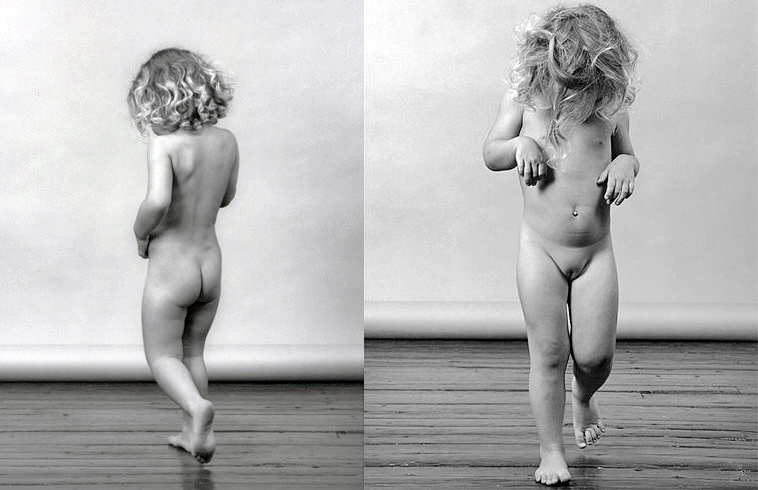
Melia Marden, 1983
In the intervening years, some of the children Mapplethorpe photographed have grown old enough to form their own opinions. Melia Marden says, with unassailable 9-year-old logic, that “everyone was born without clothes” and that she likes the picture Mapplethorpe took of her “because it's funny.”
Jesse McBride, who just out of high school and turned 19 in May 1990, currently lives in Los Angeles and was traveling in India for a year before beginning college at Sarah Lawrence in the fall. He saw the Mapplethorpe exhibit in Berkeley and, his father reports, “was kind of amused and a little bit tickled that he was the center of controversy.” He remembers being pleased when his picture was selected for “The Perfect Moment.” “It never occurred to me that it would be a big deal. It's sick to equate it with pornography.”
Last fall, after the exhibit had been bounced by the Corcoran Gallery of Art but had not yet caused indictments and trial in Cincinnati, Jesse McBride recalls that Mapplethorpe photographed him when he was about five and told critic Ingrid Sischy of the New Yorker that he remembered “jumping around and laughing” while Mapplethorpe tried to photograph him.
“I must have been four or five then. I was living with my mom in the Village, and she was friends with Robert, so I knew him a little bit. I remember jumping around and laughing. She told me he wanted to photograph me. No one forced me into anything. I would run around naked a lot at that age. I’m not as free-minded now. In those days, I’d just take off my clothes and start jumping on the chair. I'd stop, and he’d snap a shot. It was fun — Robert snapping away, and my mom laughing. He didn’t ask me to do anything obscene. I don’t know if he said anything while taking the pictures. When I got older, up to when I was twelve, I was embarrassed by the picture. I turned it toward the wall when my friends came over. I didn’t want them to see my private parts. I didn’t mind the adults’ seeing me naked, but when you’re that age you’re easily embarrassed by friends. Now when I look at the photograph I think it’s a really beautiful picture. I think back to when I was so young and innocent. I look particularly angelic.” 36
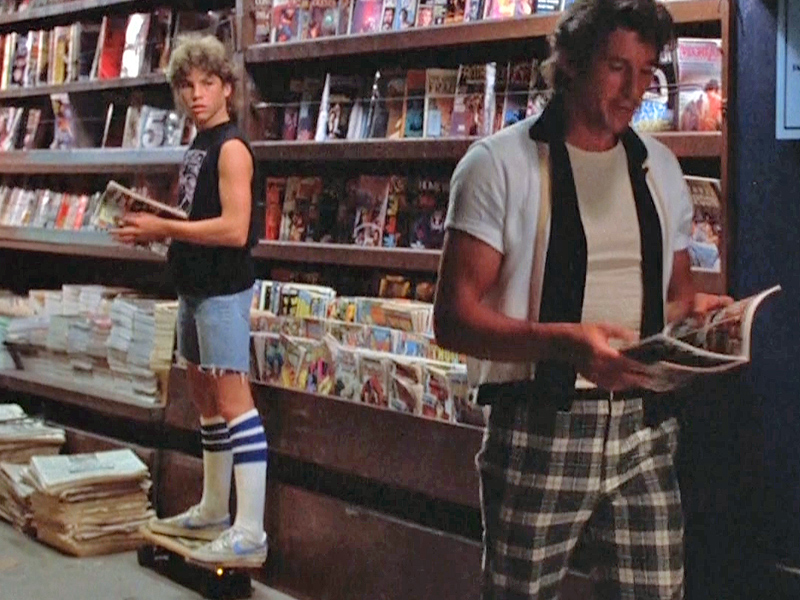
Jesse McBride as Thunderbird Kid with Richard Gere as Jesse Lujack in the film Breathless, directed by his father Jim McBride, 1982
As Pat Steir, a painter, pointed out, this image echoes almost exactly a 1506 drawing of a young boy by Dür"I asked Robert, being a close friend and top photographer, to take a photo of my sonnna with the Greenfinch.”39
The Picture of Innocence
When Jesse McBride was a little boy, he painted pictures in his mind, blissful images of a bucolic country setting. "I dreamed about a house in the country, a farm where I could be self-sufficient." Now 19, he gets excited when describing his pastoral vision. "I would have a wife and lots of kids running around. And it would be a nice farm with pigs and cows."
What a sweet, unadulterated image – a nice farm with pigs and cows. But there are those who say the blond cherub who dreamed that dream was a victim of child pornography and perhaps child abuse. A nude photograph of Jesse, taken in 1976 by Robert Mapplethorpe, is one of seven contested images that led to the indictment of a Cincinnati museum and its director and fueled outrage nationwide. The portrait is included in a retrospective called "Robert Mapplethorpe: The Perfect Moment," which opened Wednesday at the Institute of Contemporary Art.
A coalition called First Amendment Common Sense Alliance has called for the photograph to be removed from the ICA, decrying what it terms the "acceptance of child porn as an art form."
As for Jesse, he doesn't understand what the fuss is about.
The day Mapplethorpe took the photograph was just like any other day. "I was running around naked that morning," he says. "My mom told me Robert was coming over to take some pictures. He asked me to get on the chair and I started jumping around. I think he might have asked me to hold still, but that's all.
"It's weird to think they would attack this picture, because there's nothing pornographic about it," he says. "It's angelic. It's art."
His parents – art gallery director Clarissa Dalrymple and film director Jim McBride – commissioned the work. Both parents and son, along with the parents who commissioned another contested child portrait called "Honey," have submitted affidavits in defense of the Cincinnati museum.
And to think that for years the portrait that has divided the city hung proudly on the walls of their homes. They didn't give it a second thought, except perhaps to admire the lyrical innocence on their son's angelic face. But one night last year, Jim McBride was watching NBC Nightly News. "His picture popped up on the news, with a big black bar over his crotch. That was the first we knew of the controversy," says McBride, director of "Breathless," "The Big Easy" and "Great Balls of Fire."
"I'm shocked by the accusations. That photograph is a great memento of my kid's youth," says McBride, who separated from Dalrymple and moved to Los Angeles 14 years ago. "We never married. We were hippies in the early days," he says. "The idea that Jesse was terribly twisted by that infuriates me. He's a fine young man, a great human being."
And the Mapplethorpe experience comes during a year when Jesse has been learning a lot about the workings of the world. During a year off between high school and his first semester at Sarah Lawrence College, Jesse labored on a farm in France and traveled to India, where he was upset to see widespread poverty.
And while some in Boston were searching for ways to get his photograph removed from the ICA, Jesse was out sailing on the Hudson River shooting his first film, an independent feature called "A Triple Bogey." It is directed by Amos Poe, who like the late Mapplethorpe is a dear friend of Jesse's mom.
Right now, Jesse wants to pursue a career in film. He points out, though, that he is not following in his father's footsteps. He was inspired by a teacher at Crossroads, a private Santa Monica, Calif., high school. While growing up, Jesse spent the school year with his father on the West Coast and summered with his mother in SoHo. "In a way, I liked being bicoastal," he says.
Like anyone his age, this young man is searching. He traveled to France to pursue that old childhood dream, to find the nice farm with pigs and cows. "I was inspired by 'Candide,' you know, cultivate your garden," he explains.
But France, he says, wasn't foreign enough. "It was too much like home with Western ideals. I wanted something totally different, something I had never seen before. And I was intrigued by the spiritual connotation of India."
The trip turned out to be quite a learning experience. "It was disturbing. The people are so poor. India is just so different, you know? You have no reference points," he says.
This young man, who sounds like a budding Henry David Thoreau, lists a rather offbeat set of reference points that influence his aesthetic. J.D. Salinger, Gabriel Garcia Marquez, Bernardo Bertolucci, Jean-Luc Godard, Voltaire. Those are artists he admires. And, oh yes, Robert Mapplethorpe.
"I was kind of angelic in the photograph," he says unapologetically. "People used to say, 'He's such a sweet kid.' That's the self-image I had."
Some local and national watchdog groups are convinced that Jesse may have been corrupted. Yet at 19, he maintains a kind of childlike innocence. Unlike those who make frequent statements about Mapplethorpe, he doesn't choose his words as if preparing a press release, anticipating a sound bite.
During a telephone interview from his mother's SoHo home, in fact, he answered the most personal questions with candor, displaying the wholesome honesty of a young man who hasn't yet learned the meaning of the word distrust.
No, he doesn't have a girlfriend right now, but he's had several in high school. No, he doesn't like his father to tell him what to do. He'd rather think for himself.
And no, he's not scarred by the national controversy. "I love it. I think it's great publicity," he says.
"He thinks this whole thing is a kick," his father says. "It's hard to embarrass this family."
And so young Jesse McBride will head off to Sarah Lawrence in the fall as a kind of mini-celebrity. He's already started his film career, a trade that requires a frenetic lifestyle. Jesse has resigned himself to that. But what of the nice farm with the pigs and cows? "Maybe some day I'll have a farm and the films. That's what I hope. Self-sufficiency is important to me."40
Mapplethorpe's image changed his whole life
The artists, politicians, psychologists and professional debaters have all had their say about the Dramatic Institute's project on children and sexuality. But it's rare that you get to hear what the kids like to participate in the creation of art. Jesse McBride was five years old when he was photographed nude by Robert Mapplethorpe. He tells that the image affected his entire life.
The image of a naked boy raised in 1989 so much attention in the U.S. that an exhibition was canceled and a museum director was prosecuted.
Jesse McBride, who was photographed by the controversial Robert Mapplethorpe, the picture has become a companion through life.
– I do not remember what season it was, but I remember it was sunny that day when Robert came to visit. I do not remember either my mom or someone else asked me to undress me. Probably I was already naked when he arrived. I often ran around naked at home at that age. We were in the kitchen of the apartment on Thompson Street and I was standing on that chair while mom and Robert stood side by side, facing me. She and Robert were good friends. My mom was elegant, evasive and seductive, sympathetic and caring without being emotionally available.38 I had met Robert many times before, but on this day I remember anyway as a special occasion, for he had brought a camera with a large, black lenses. He pointed it at me and said I could do whatever I wanted. I jumped up and down in the chair and climbed on the backrest.
The image Robert Mapplethorpe took shows a slender five year old sitting on a velvet armchair, naked, with their legs spread apart, as if he just made a jump. To the left is a large, white refrigerator. A cord hanging down from the wall.
At first it brought little interest.
– I do not even know if it was displayed in public before Robert died. I lived most of the time with my dad and he placed the photo on a shelf in the kitchen. He was proud to Robert Mapplethorpe had photographed me, he even used to brag about it to their friends, says Jesse McBride.
The father was – and is – a director in Los Angeles, the mother still works as a gallery owner in New York. In the environment where Jesse McBride grew up was nudity naturally. He describes himself as “a kid of lefty hippies” (children of hippies left ), “grew up just after the sexual revolution, and just before psychotherapy boom”.
– It was not until I was a few years older that I reacted to the picture. I thought it was pain to my showed penis. This feeling became even stronger when a couple buddies greeted at our house one day and started pointing at the photograph and to joke that I was naked. After that, I turned it is always against the wall when my friends came to visit.
On 9 March 1989 Robert Mapplethorpe died of AIDS 42 years old. Then, he was one of America's most famous – and controversial – photographers. That same year began his best shots touring around the U.S. with the exhibition The Perfect Moment. It ran pictures of homosexual sadomasochism, but also beautiful flowers, statuesque bodies, portraits of known and unknown friends – and the image of Jesse McBride.
When The Perfect Moment reached the Corcoran Gallery in Washington DC was met with protests from the conservative Christian organization American Family Association (AFA). The organization was supported in its condemnation of the Republican Senator Jesse Helms and other conservative politicians.
Three weeks before the exhibition was opened in the capital, the gallery decided to set it up. It led to much media attention and demonstrations for and against Robert Mapplethorpe and his photographs.
Critics tried to show that Mapplethorpe was an obscene pornographer. Their main argument was the photograph of the naked five year old.
In a press release from July 1989 AFA describes the portrait as “a picture of naked little boy, about eight years, who proudly displays his penis” and then adds that the image is made “for homosexual pedophiles”: “For pedophile homosexuals, there [is] a shot of a nude little boy, about eight, proudly displaying his penis.”
In a congressional hearing in September 1989, called a Republican congressman Robert Mapplethorpe for “a child pornographer, who lived a homosexual, erotic life and died a horror full death from AIDS.” A week later demanded Jesse Helms to all artistic exhibitions financed with state funds would have specific restrictions, among other things, to prevent “exploitation of children”.
The Perfect Moment continued to create controversy on its journey through the United States. In Cincinnati indicted a museum and its director for spreading obscenity and pornography (court acquitted them later on all counts).
Jesse McBride, who is now aged 19 years, suddenly became famous. He was interviewed in newspapers, radio and television. People Magazine did a story from his college.
All around him, including the parents, had distanced itself from censorship and accusations that the image of Jesse was pornographic. All proceeded well from that he thought the same.
– I really had no own opinion, so I did what was expected of me and took a stand that the image would appear.
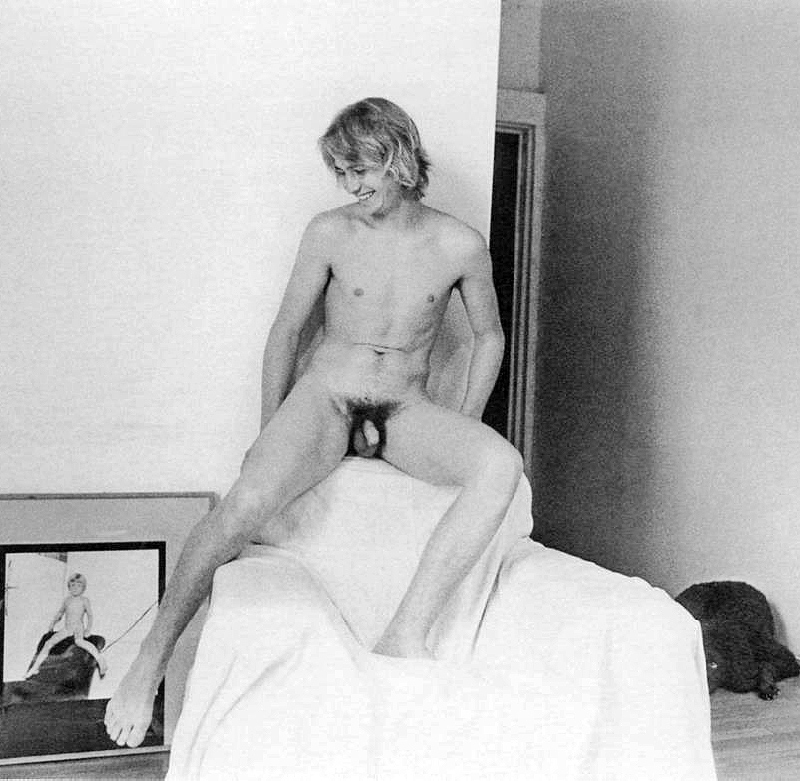
Jesse McBride in his mother’s home, 1990 by Judy Linn 14 years after Robert Mapplethorpe’s Jesse McBride, 1976. According to Linn, it was McBride's idea to remove his clothes for the shoot, an idea with which she was happy to comply.
He posed nude on the cover of The Village Voice (next to the old image) and interviewed in the same issue of the renowned art critic Ingrid Sischy. The picture and article formed together a defense of free speech and an attack on those who wanted to censor artistic creation. Shortly afterwards, he was invited to the inauguration of The Perfect Moment in Boston.
– It was very glamorous. I thought it was fun with the interviews and attention. At school all knew who I was and people I never met before came up and wanted to talk to me.
Several years later, when he moved to New York, knew people still recognize him as “Mapplethorpe's boy“. But then he had begun to tire of the attention.
– Sometimes I felt almost paranoid: it was as if people did not care about the real me, they saw me just like that boy in the photograph.
A few years ago, Jesse McBride contacted by an attorney from The Mapplethorpe Foundation, which manages the Robert Mapplethorpe's photographic heritage. The lawyer wanted him to sign a contract that gave the Foundation the right to display the image across the world.
– It felt uncomfortable. I did not sign.
But soon afterwards he was selected on an interview for the American movie Dirty pictures (2000), a documentary about the trial in Cincinatti.
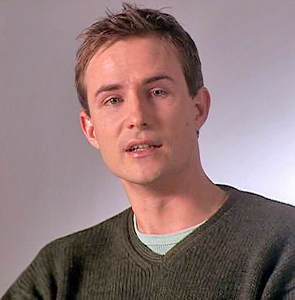
– And I didn't feel then that I was being exploited. And, you know, it's the same thing as if a friend of the family's had come over and taken a picture – a snapshot of me when I was naked in the apartment. I mean, that's what happened. And it so happens that it was displayed as a piece of art. It's not a political issue, and it's not child pornography, in my opinion..
And when this interview is done he poses again with a picture from 1976. This time dressed.
– My feelings about what happened is still mixed and rather confused. I'd rather not want people to know that it's me in the picture. But if they do not find out, I usually say that “it is fantastic” and things like “I love free speech.” But reality is not the case. There are other rights, too. Like for example the right of protecting their privacy.
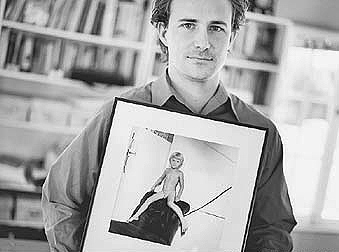
Jesse McBride, 2005 by Alexander Ruas 29 years after Robert Mapplethorpe’s Jesse McBride, 1976
Jesse McBride with the image as Robert Mapplethorpe took of him, and who in 1989 started a heated debate about what is allowed in art. Today, Jesse McBride 33 years old and works as a butler in a hotel in Los Angeles. He is married but has no children.
Jesse McBride still think Roberts picture has nothing to do with child pornography.
– Nor do I think that there is something wrong with taking pictures of their children when they are naked, but I hesitate a bit when I say this it is a sign of irresponsibility if you allow even children's genitals is exhibited to public view.
– The day I become a parent myself, I will certainly take photos of my kids naked – but even if the images are beautiful, they may stay in the family album, at least until the children are of age and can take their own decisions.37
From our correspondence
Some of our responses came through the mail.
“I feel really good about who I am.”
One of our respondents was a thirty-one-year-old contractor living in Hawaii. He had been a good student through elementary and high school, but decided against going to college in favor of working as a contractor and earning what would give him the chance “to live the way he wanted to become accustomed.” He has been divorced twice and is presently single. He has one child.
He told us that being raised a nudist helped him to see that his body and the bodies of others are perfect creations just the way they are. He said:
“At this point in life I have only incredible gratitude toward my parents for having the courage to participate in a way of life for which there was virtually no agreement at the time. When I reflect back on my adolescence and pre-adolescence as a nudist and look at the impact it has had on my development, both sexual and social, I can only consider myself very lucky to have had that experience.”
“If life is a progressive and continual process of evolution and a continual process of letting go of attitudes and ’positions’ one grows out of — as I believe it is — then I experience myself as having grown considerably and at a relatively early age in the area of sexual development and body acceptance. Feeling good about my body is part of feeling good about who I am generally. And I feel really good about who I am. Feeling good about my body and who I am makes it easy to feel good about others’ bodies and who they are.
“Fear of exposure, fear of our and others’ bodies, and fear of our sexuality and body functions are just the stuff we all get and have to process out sooner or later. I feel fortunate at having had the opportunity to begin processing it out sooner. Although I do not practice organized social nudism now, I do participate in social nudity at times. The difference for me is that at this point I do not need the structure of the organization. I do not oppose it; I just find that, with my lifestyle, I don’t need it.”
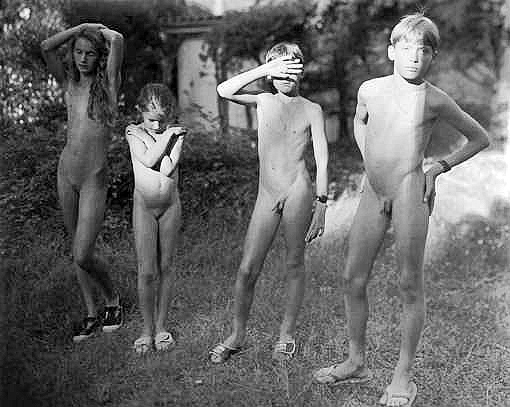
Canadian family
Two of the subjects for our study presently live in Canada and like some of the other respondents did not grow up in organized nudism: they grew up in a part of culture that looks upon nakedness and social nudity with far less contempt and far more acceptance than the American system most of the other respondents were products of. They are husband and wife and have lived in Canada for eight years.
He was born in Prague, Bohemia and lived in the Sudetenland until he was seven. He was the son of a prominent Jewish lawyer and politician. After the German invasion of Sudentenland he spent a year in southern Bohemia; then moved to Poland, Sweden and finally he and his parents found their way to England where he spent the next thirty years of his life. The first year of his education was while he was living in Sudentenland and there he studied in German; the second was in Czech and the third, and remaining years of his schooling was taken in English. He received an Honours degree in social anthropology from the University of Cambridge and was a graduate student at the Social Sciences Research Centre, University of Edinburgh. After receiving his Masters degree he spent ten years in the computer industry and this was followed by three years as Senior Lecturer at Imperial College of Science and Technology, London. For the last eight years he has been Associate Professor of Computer Science at the University of Calgary. He is also Director of Co-op Centre Credit Union Ltd., and the President of the Calgary Chapter of Credit Unions. He and his wife are members of the Canadian Sun Ranch in Calgary, Alberta.
She was born and raised on a small farm in southeast Finland. Her early schooling came to an abrupt end with the start of the war in Europe. She worked as a volunteer through her teenage years helping tend the wounded and refugees at roadside first aid and feeding stations. At fifteen she became a management trainee with the cooperative movement and at nineteen became a store manager. Her father died when she was eleven and her mother when she was twenty-one and after four years went to Australia but only stayed one year. After returning to England she met her husband to be and at twenty-seven was married. For three years she worked as an art model at an art college and later opened up her own dressmaking business. When their two children were born she became a homemaker and for the last 12 years has been very active in the co-operative movement in Canada.

In summary
Many of the people we interviewed, talked to, as did the last young man, spoke of not being nudists any longer, as did the last young man. When I questioned them about their activities, they talked of still going to nude beaches or participating with friends in social nude activities at someone’s house or on camping trips. They seemed to make a distinction between being a “nudist” and just going nude with friends.
When I asked them about this, they all said that for them by their definition a nudist was a member of a club that practiced nudism. They felt that not wearing clothes, to simply not wear clothes in social situations does not make a person a nudist and a member since dues, membership committees, and other guidelines are an integral part of organized nudism. But the openness — the acceptance of body — seems basic to them all.
These are the people of our study: the adults who came from the children raised as nudists, or in open physical environments. These are the adults who are the results of an openness against which the experts have issued dire warnings. In the following chapters we will look deeper into these people’s lives to see how they compare with the general population. Only then can we determine the true impact of their childhood experiences among nude siblings, friends — and their naked parents.

>>











































